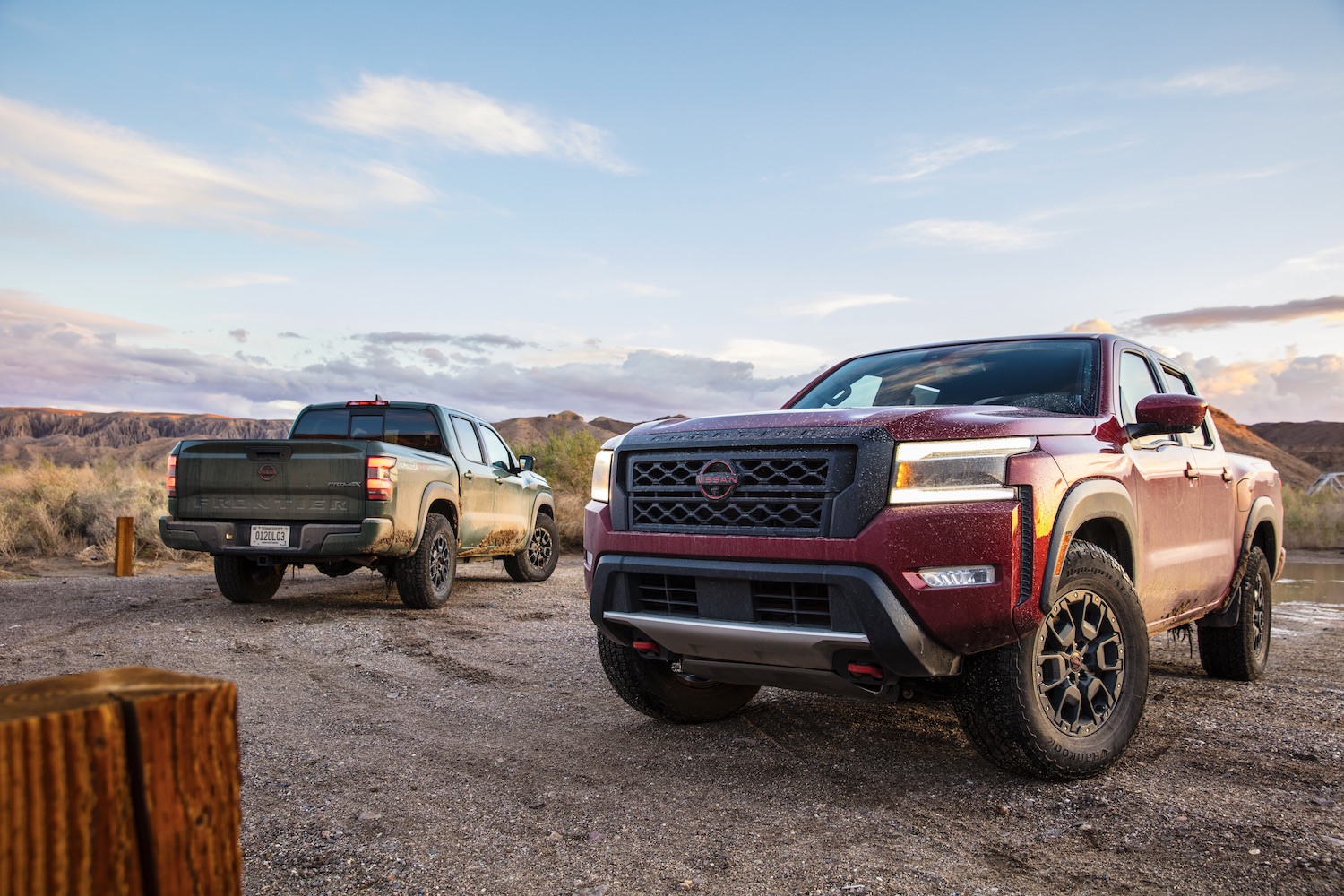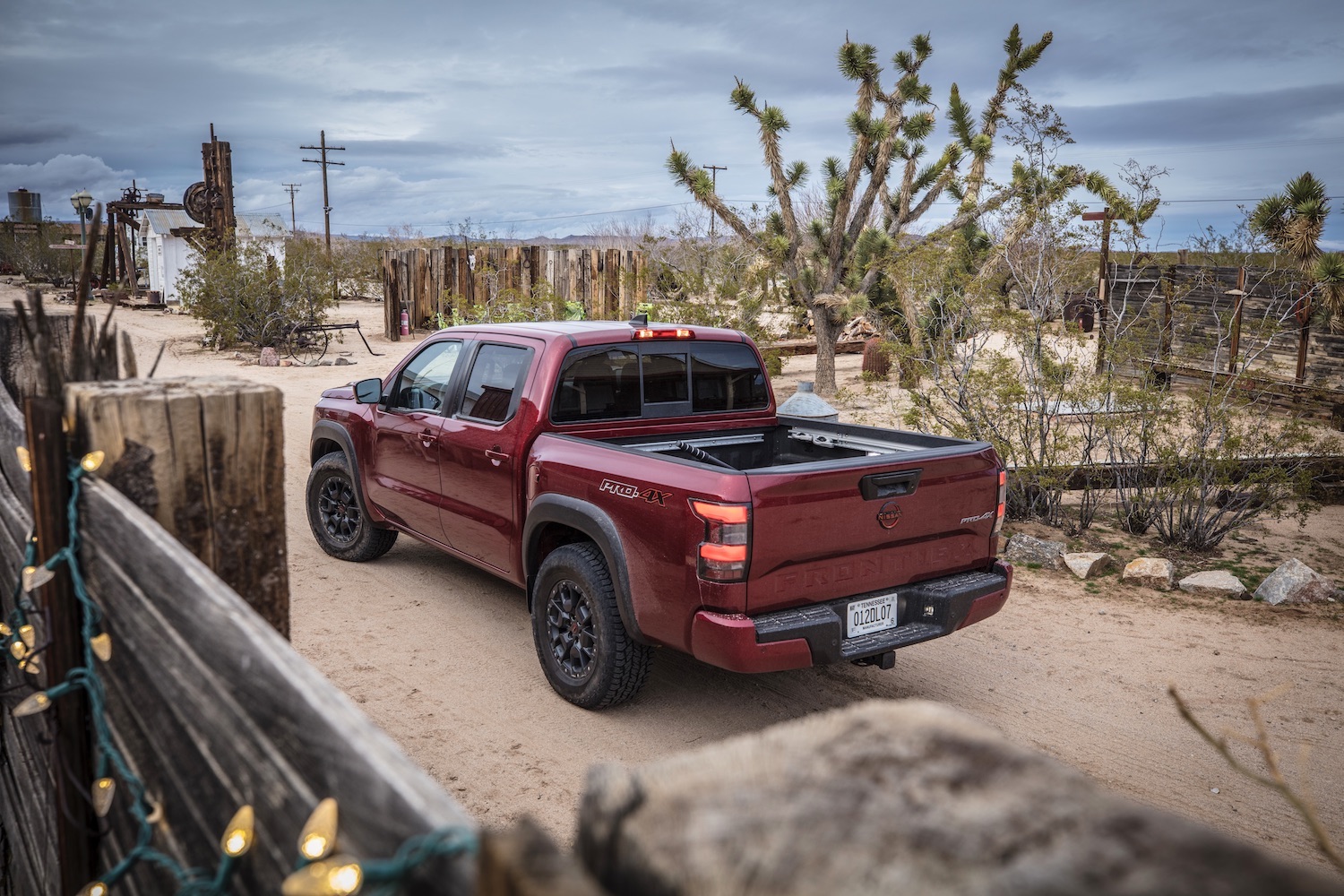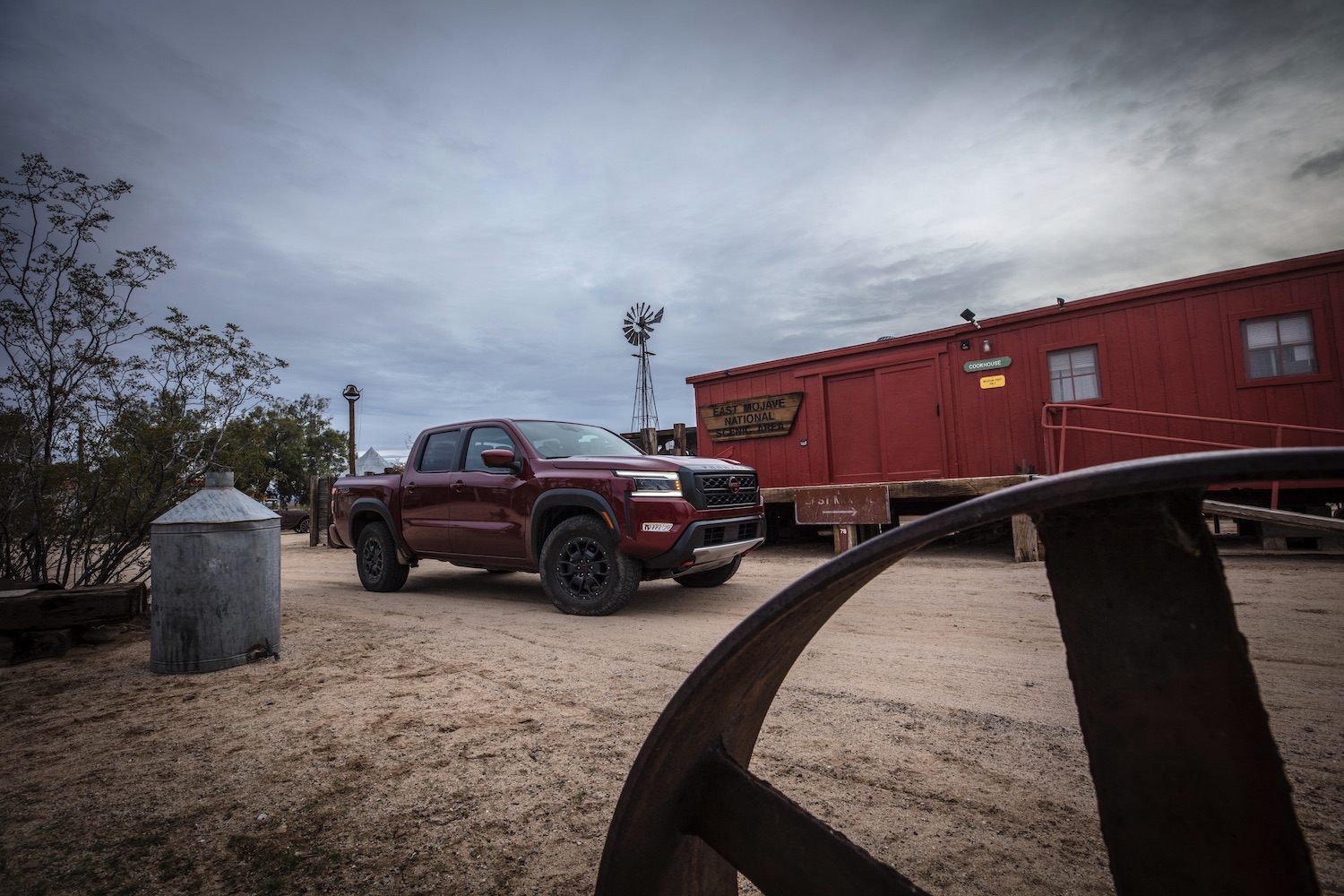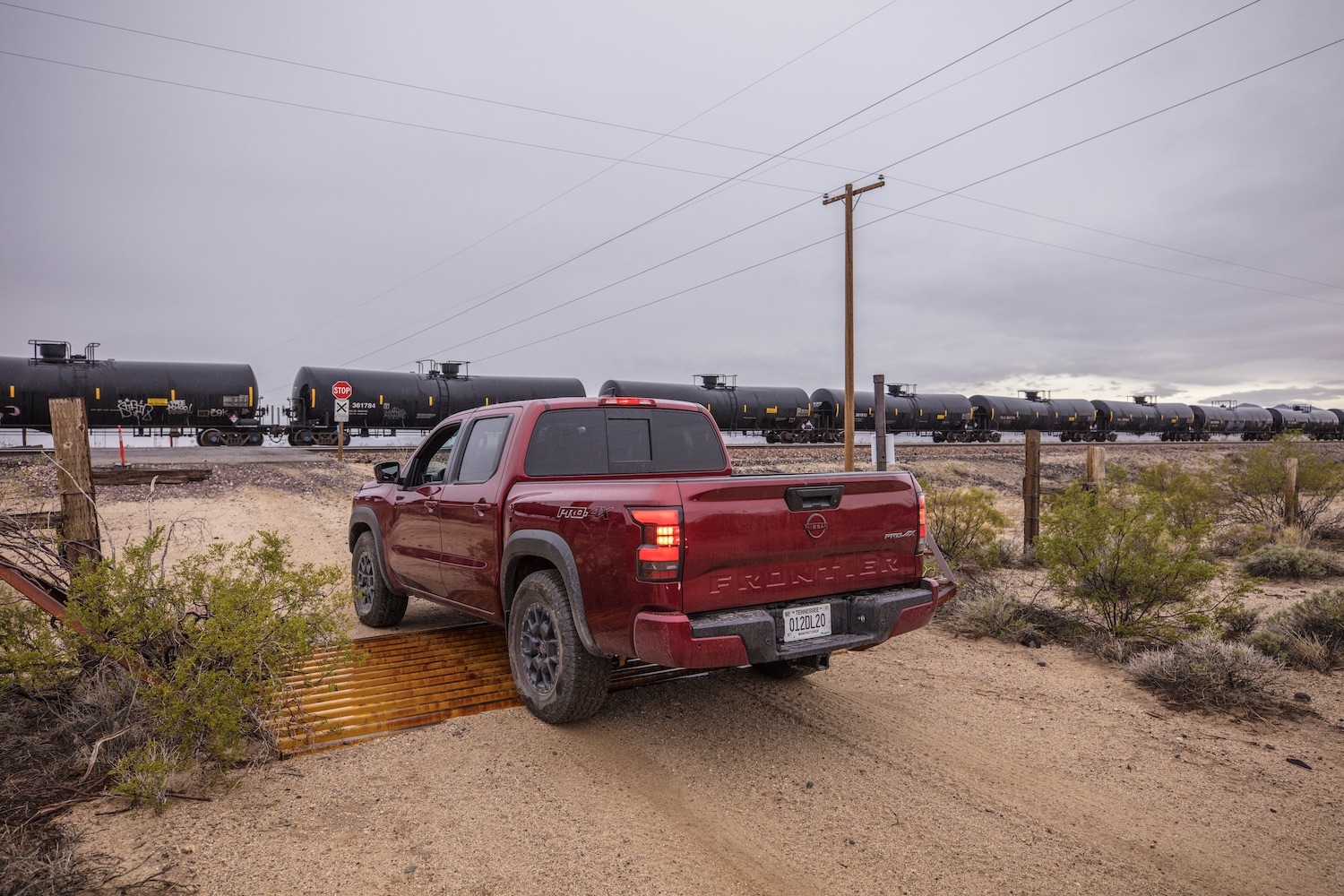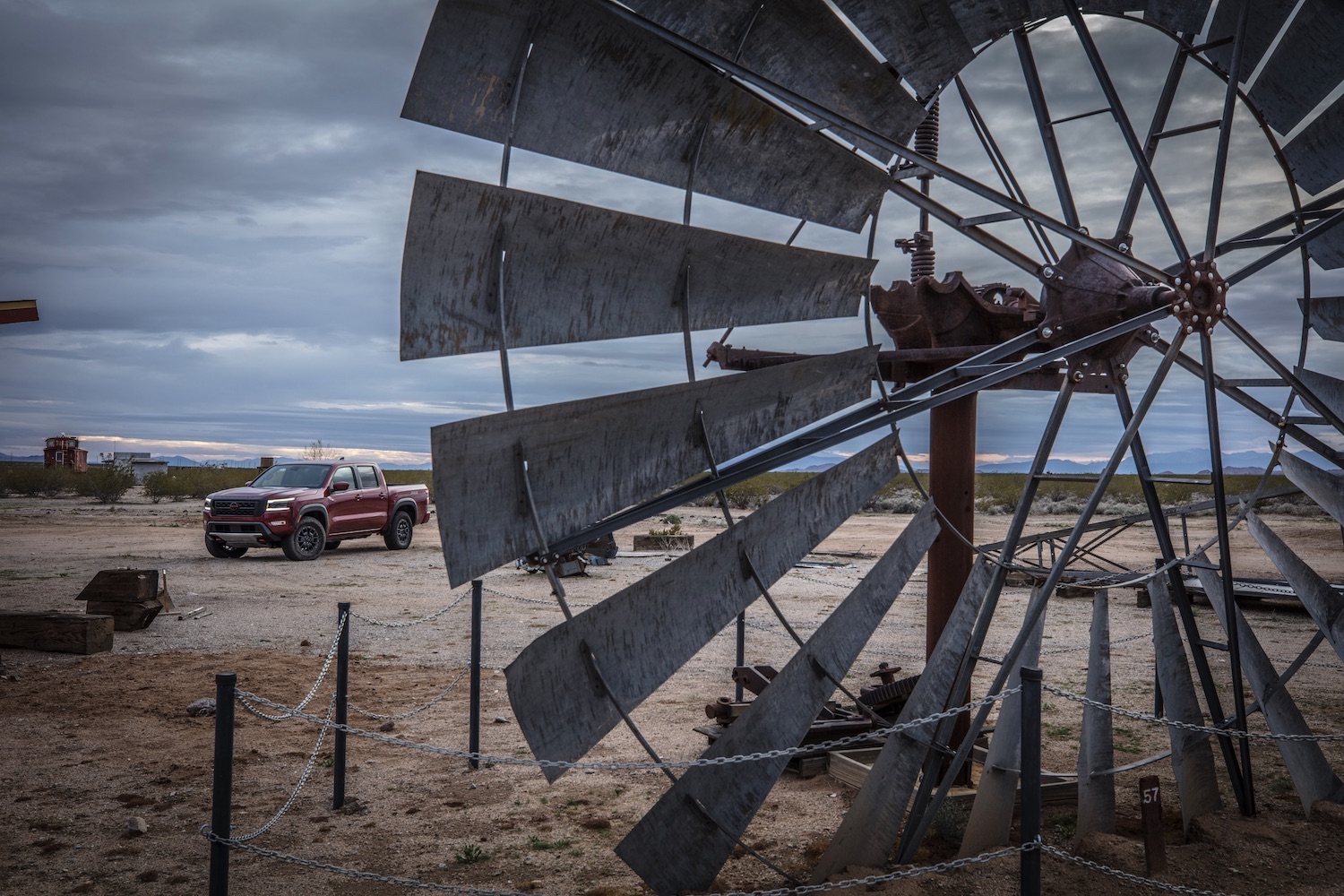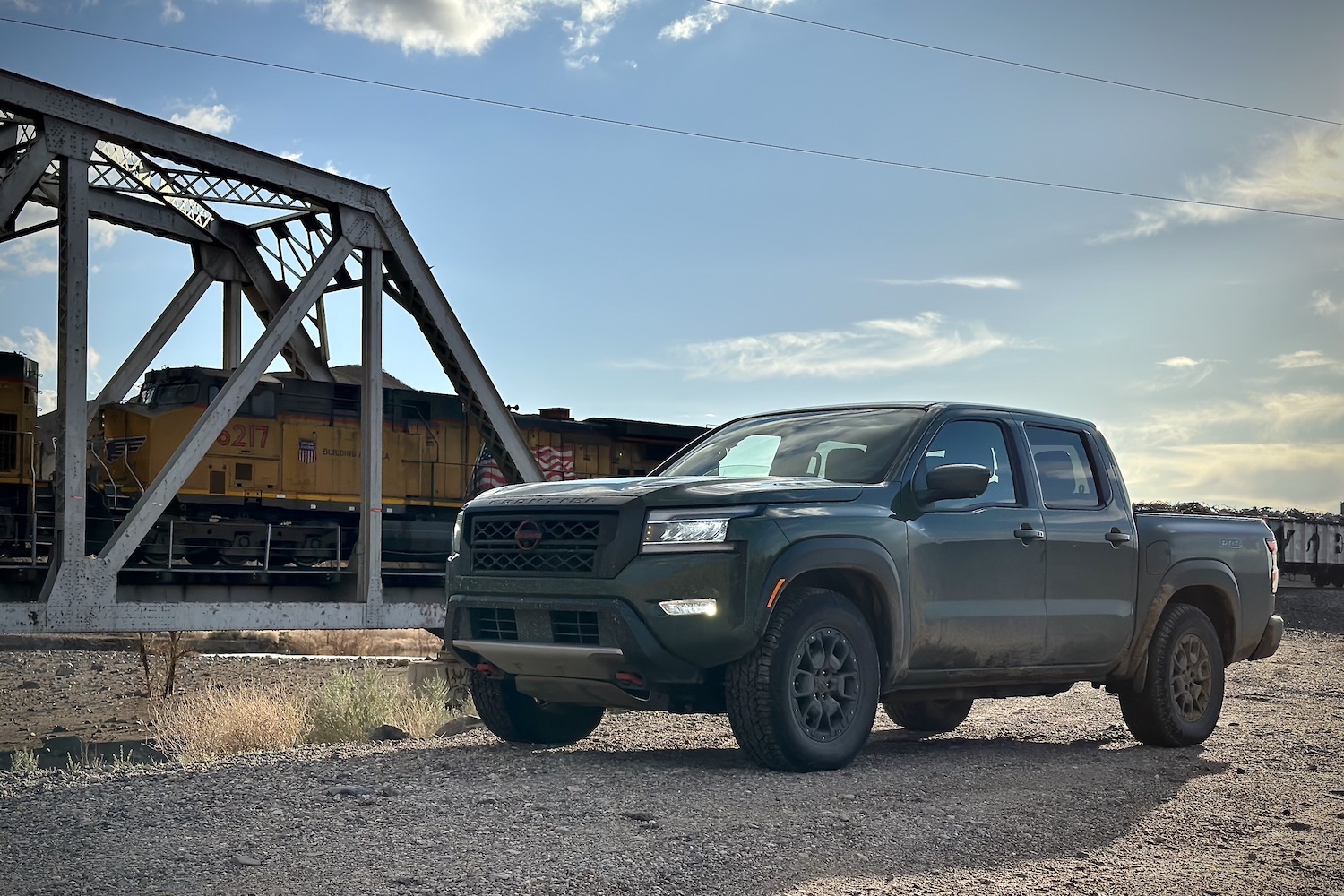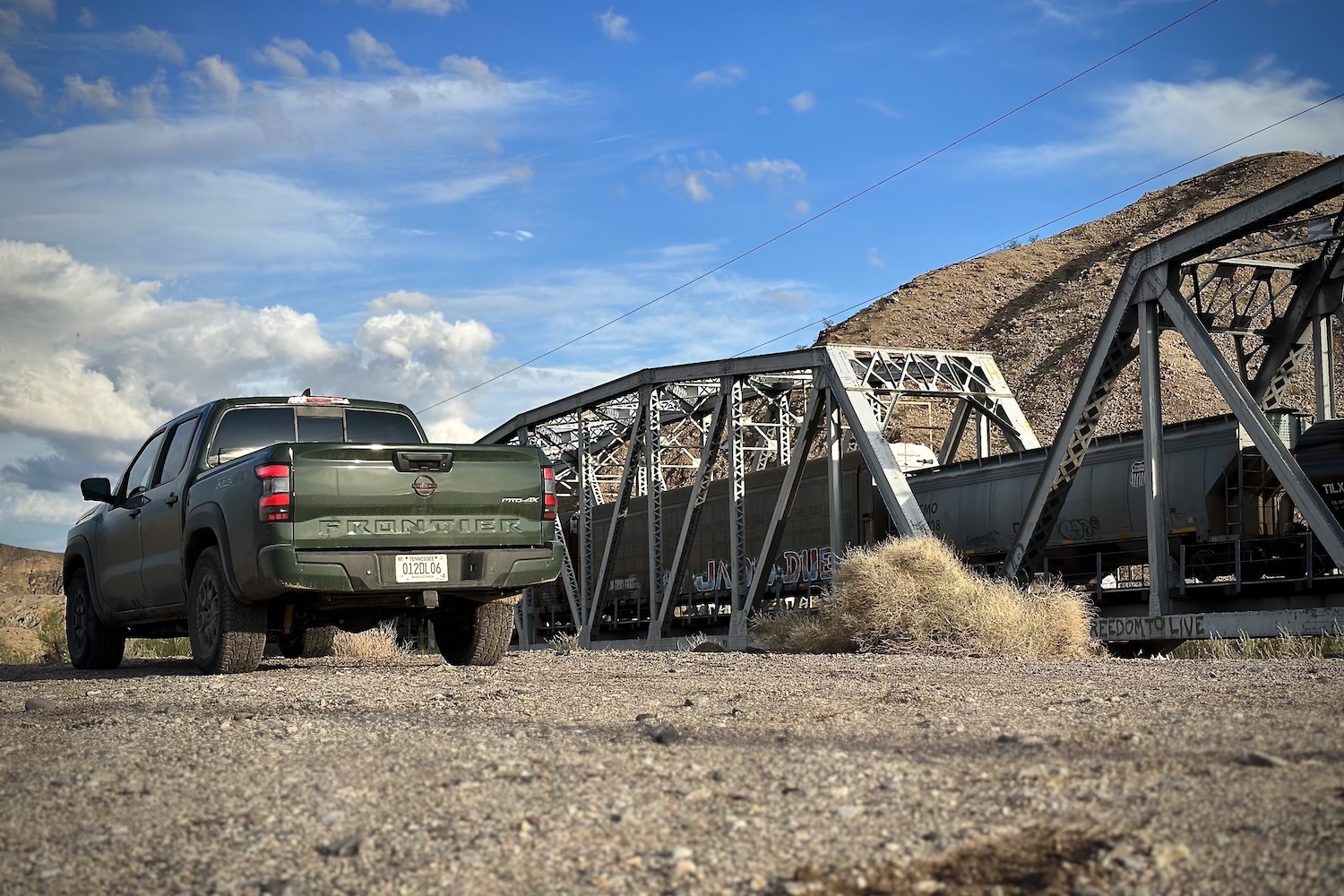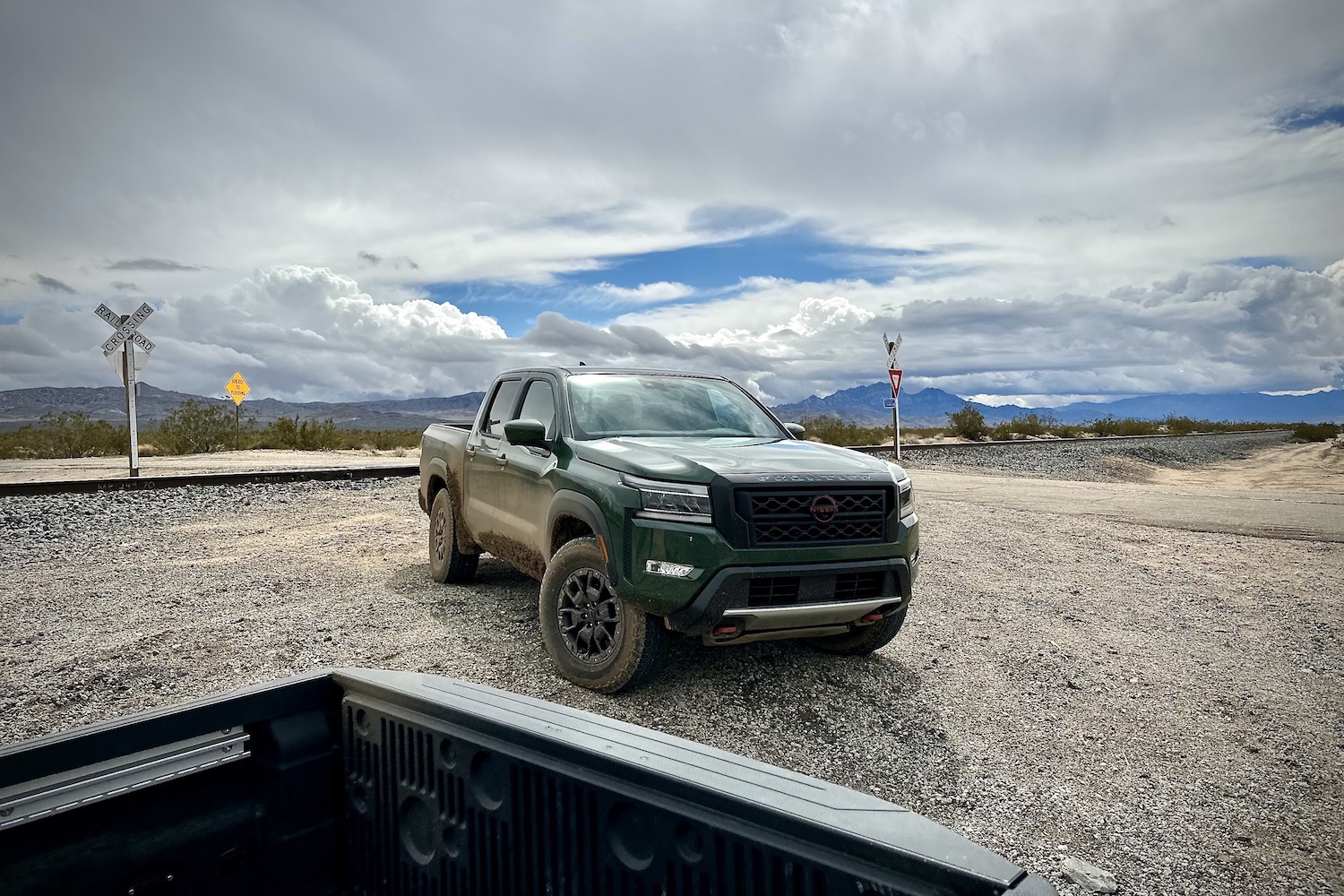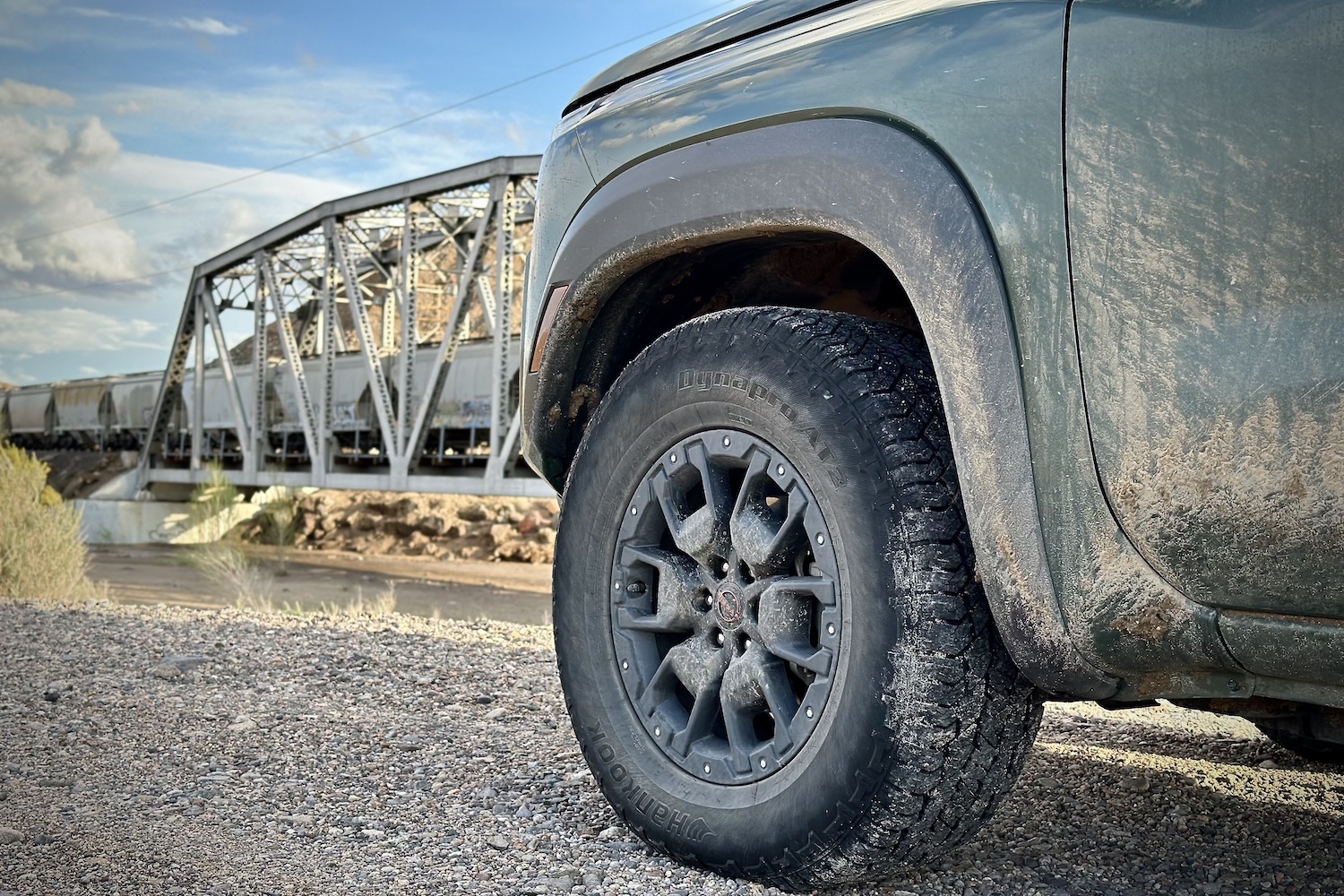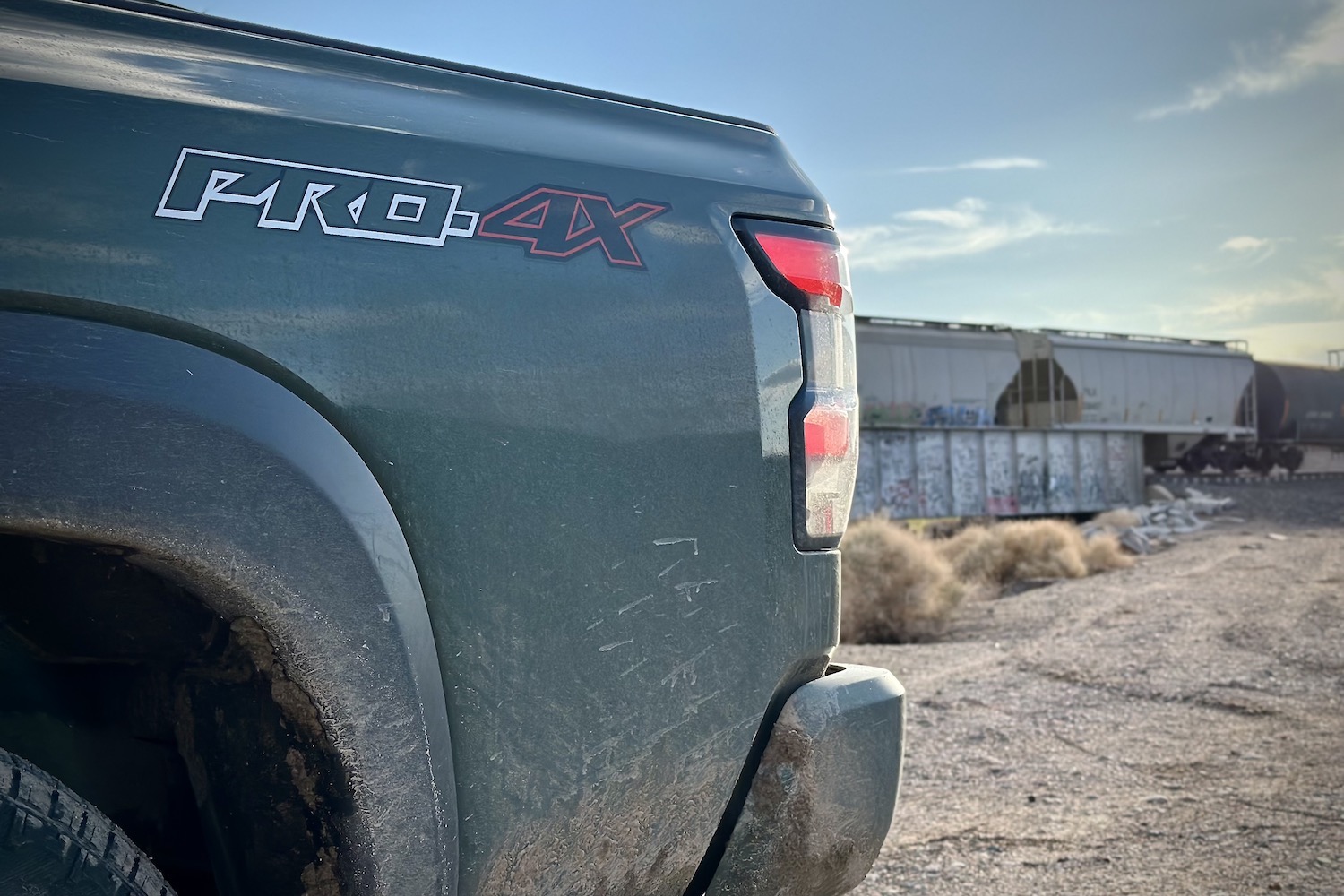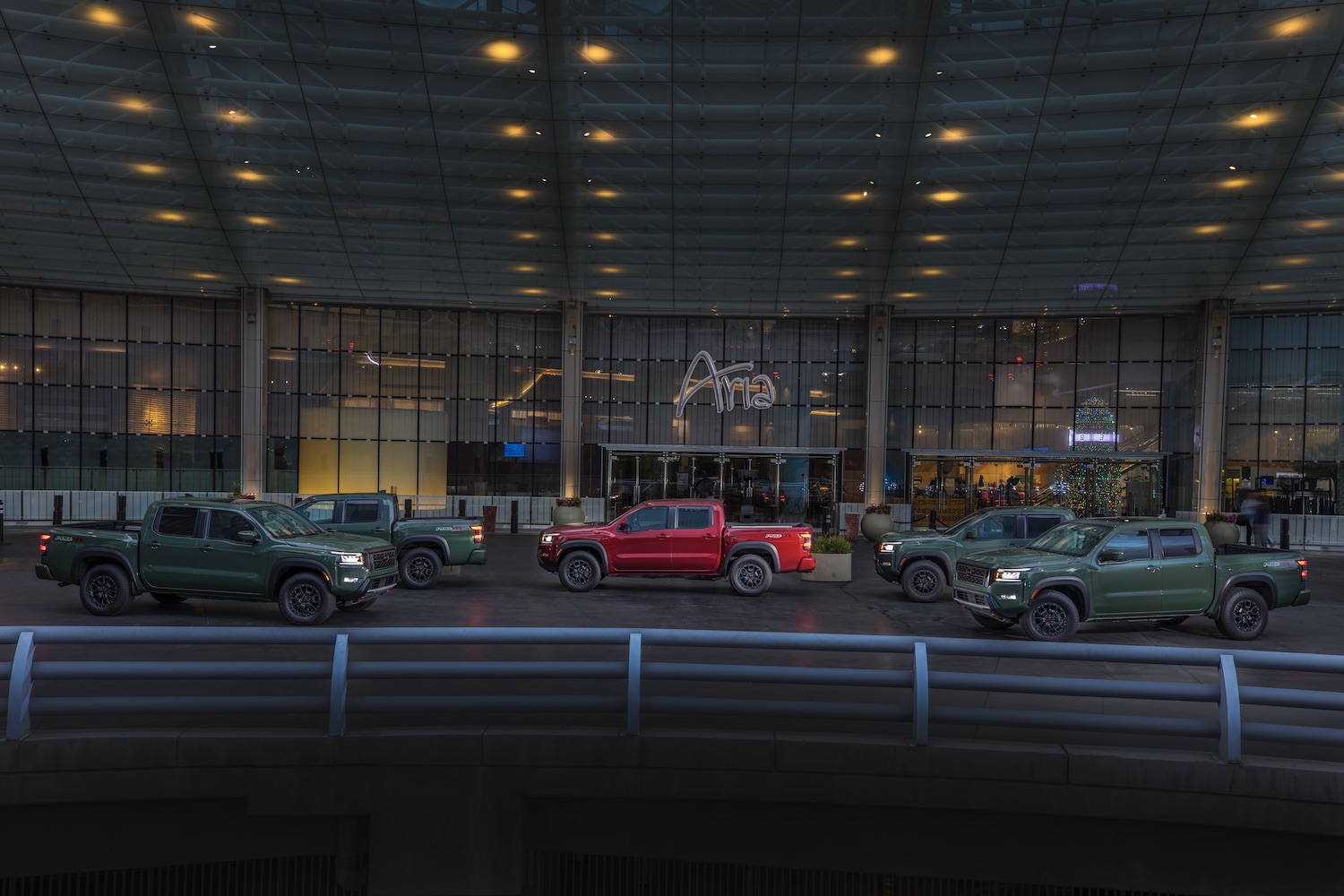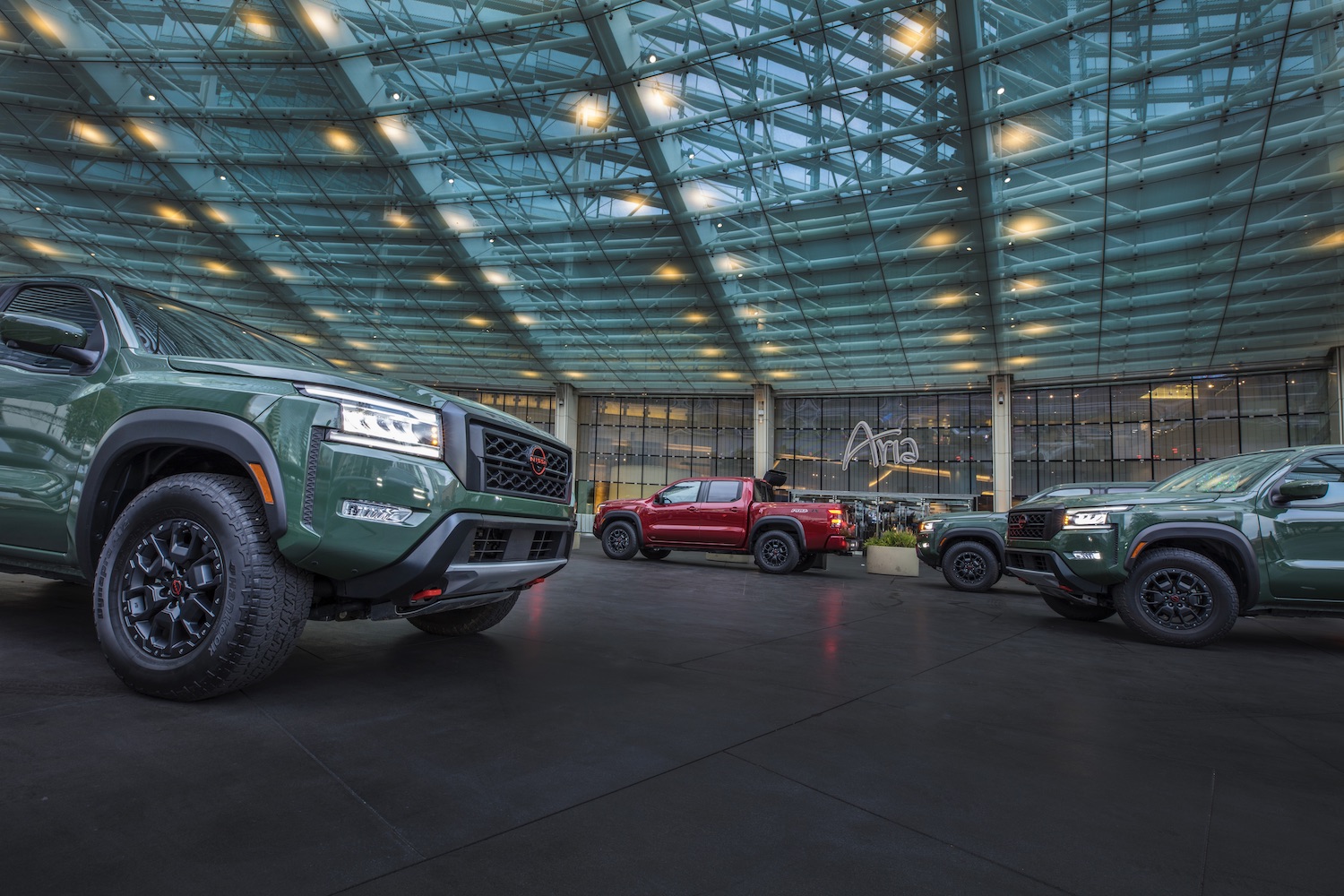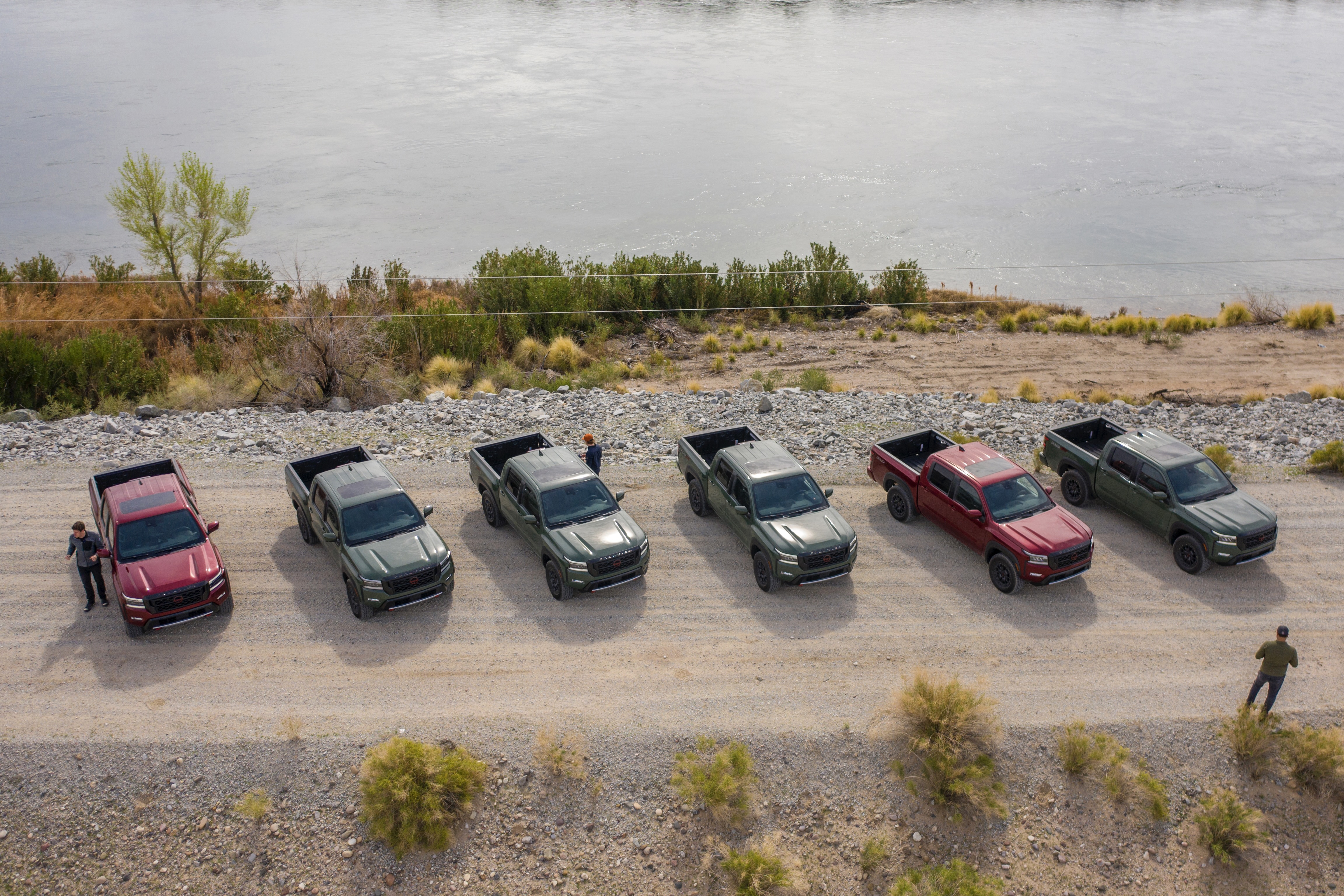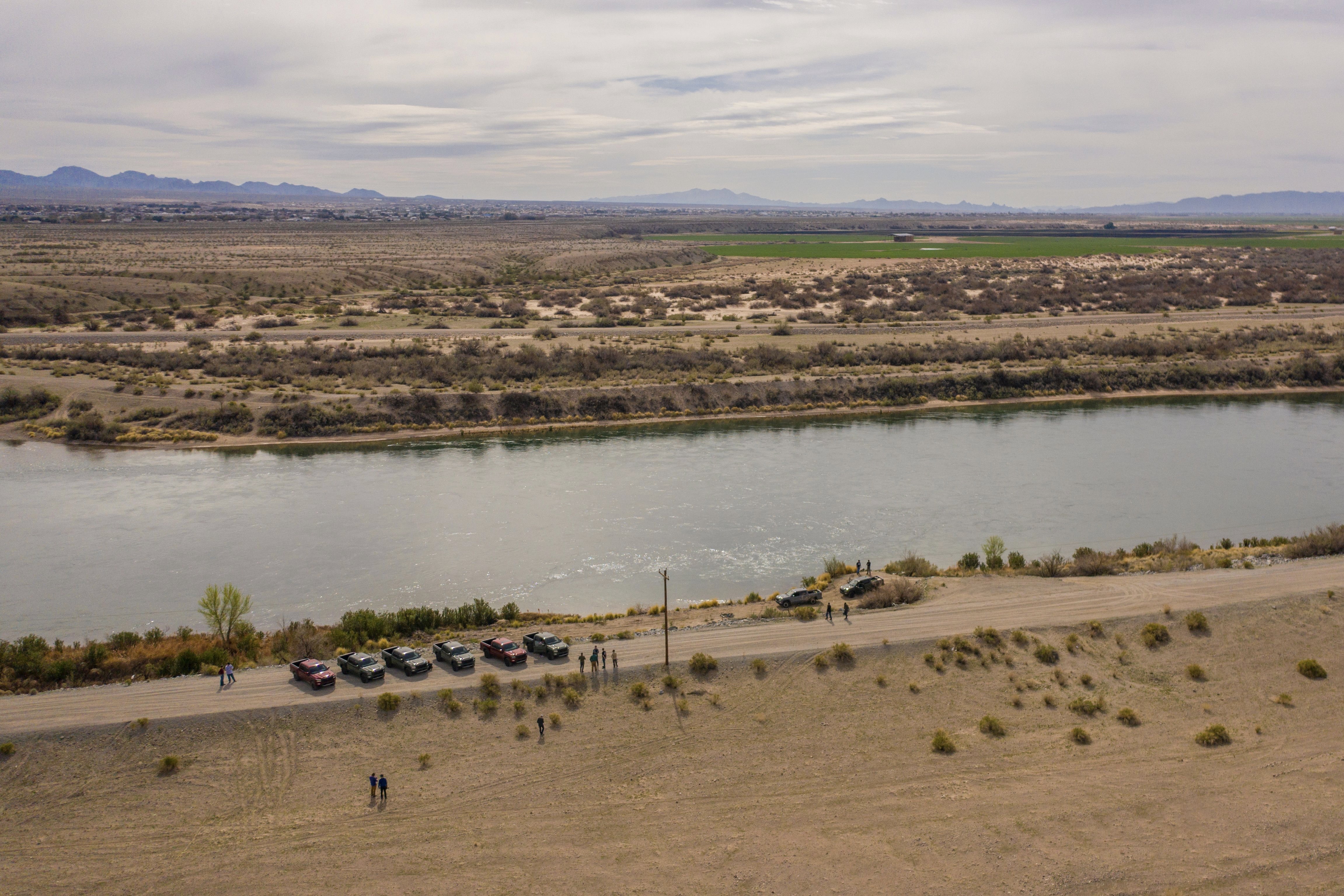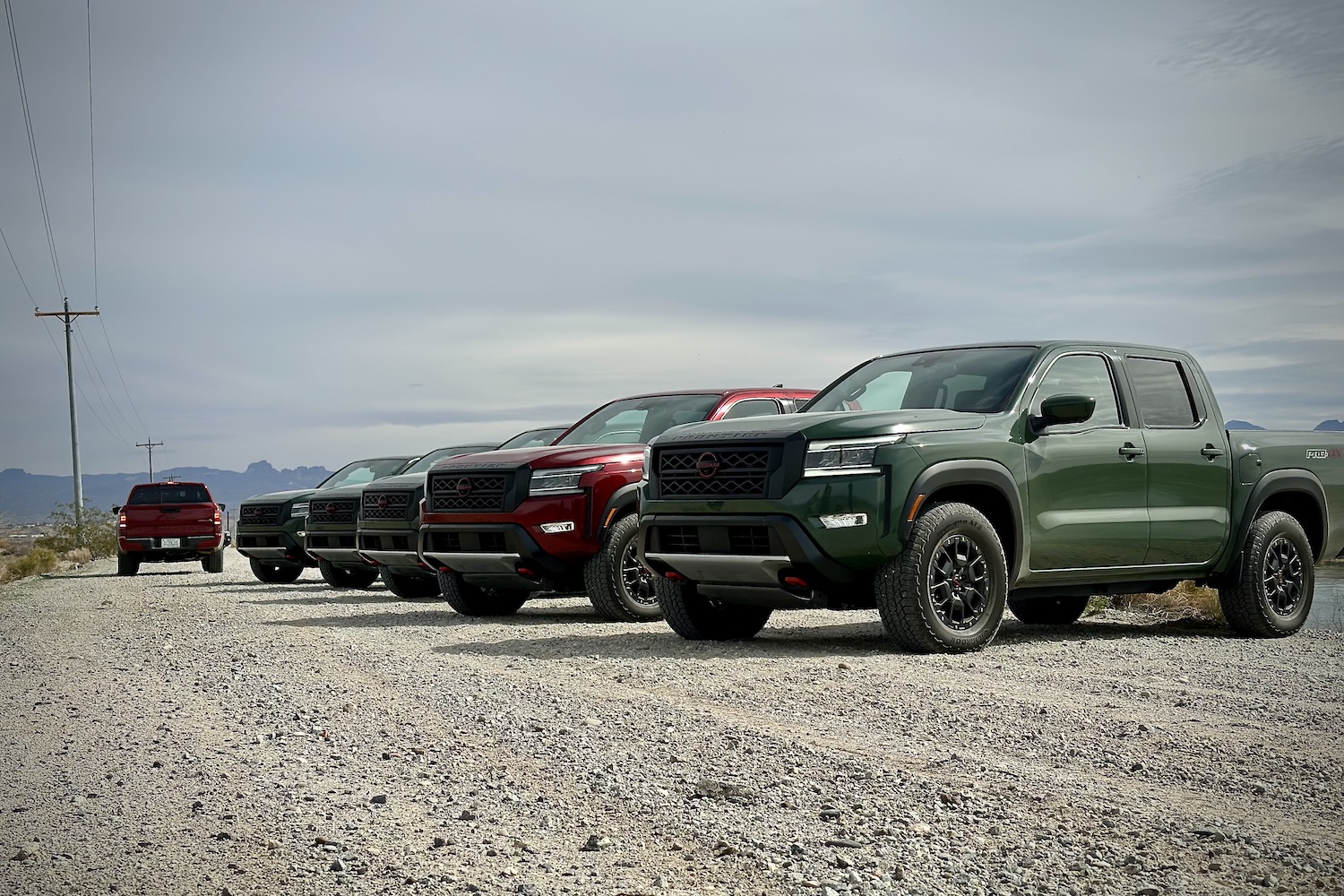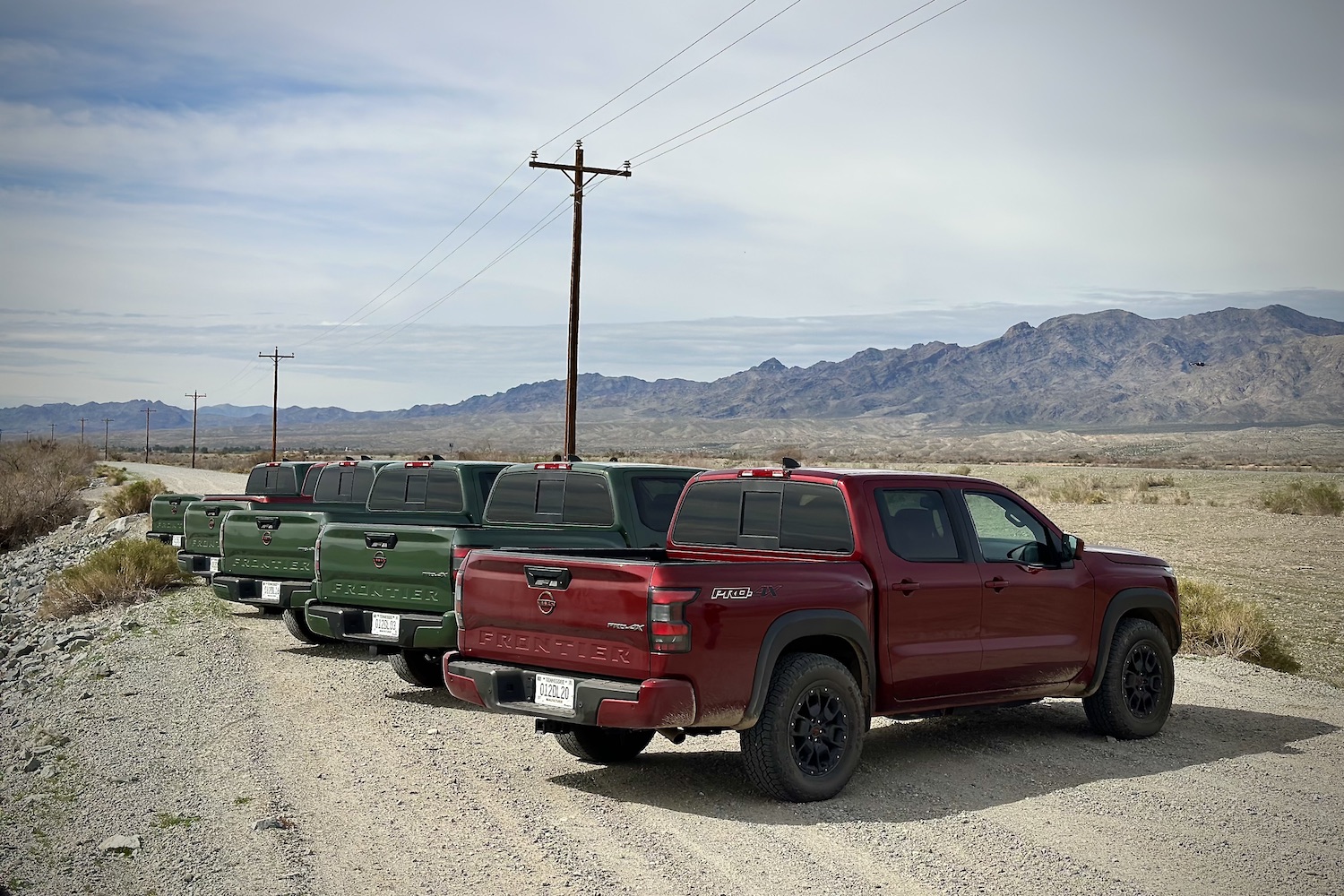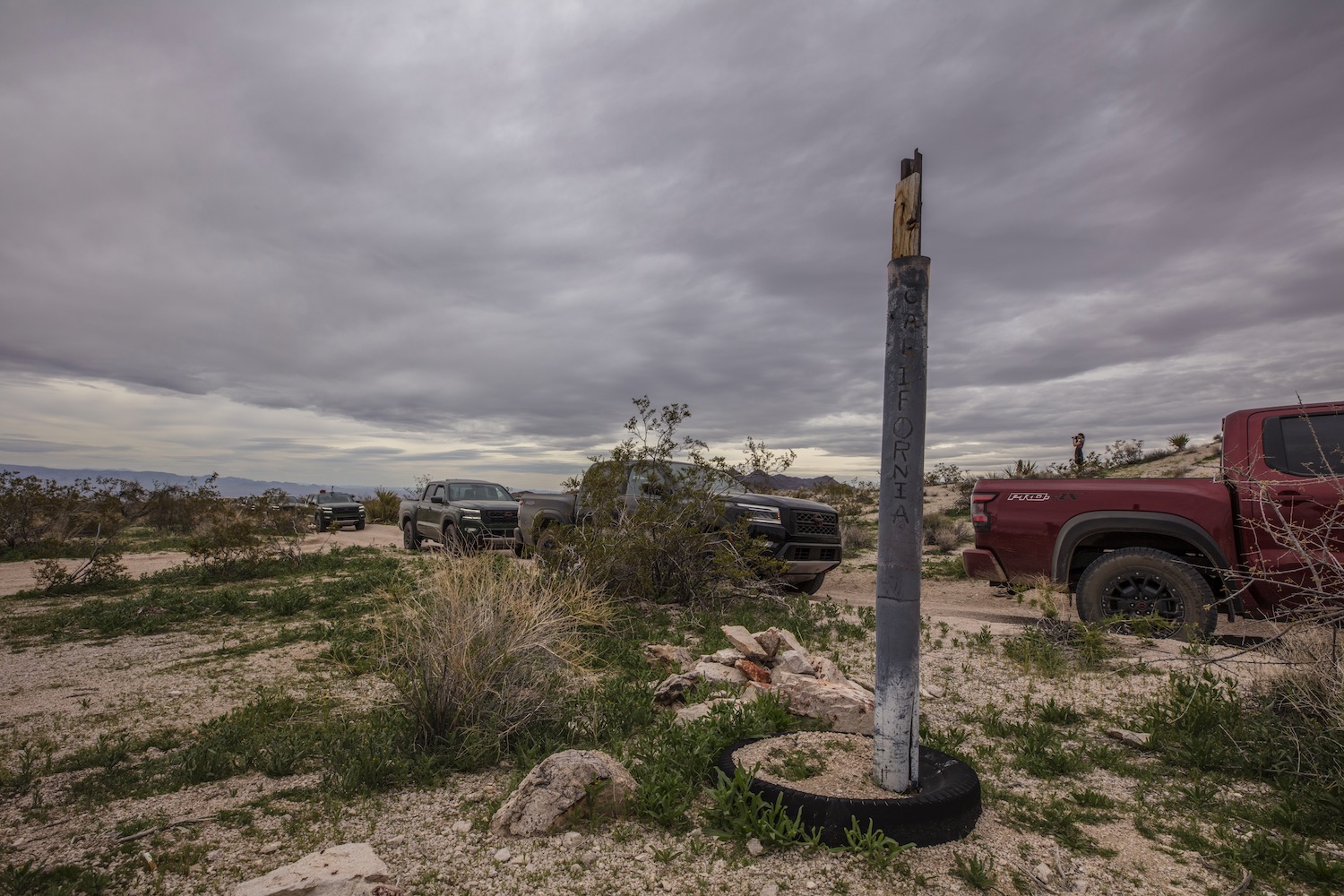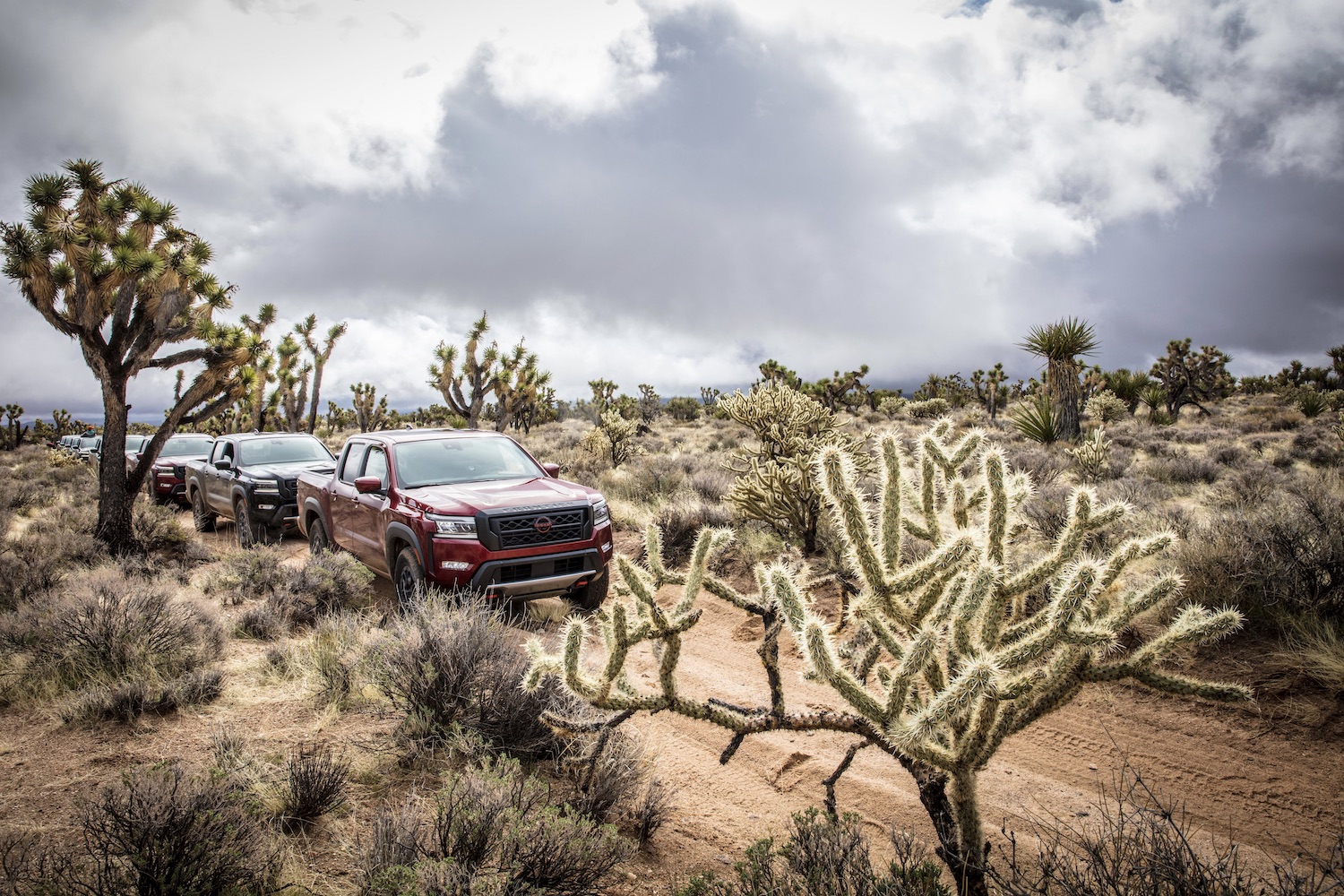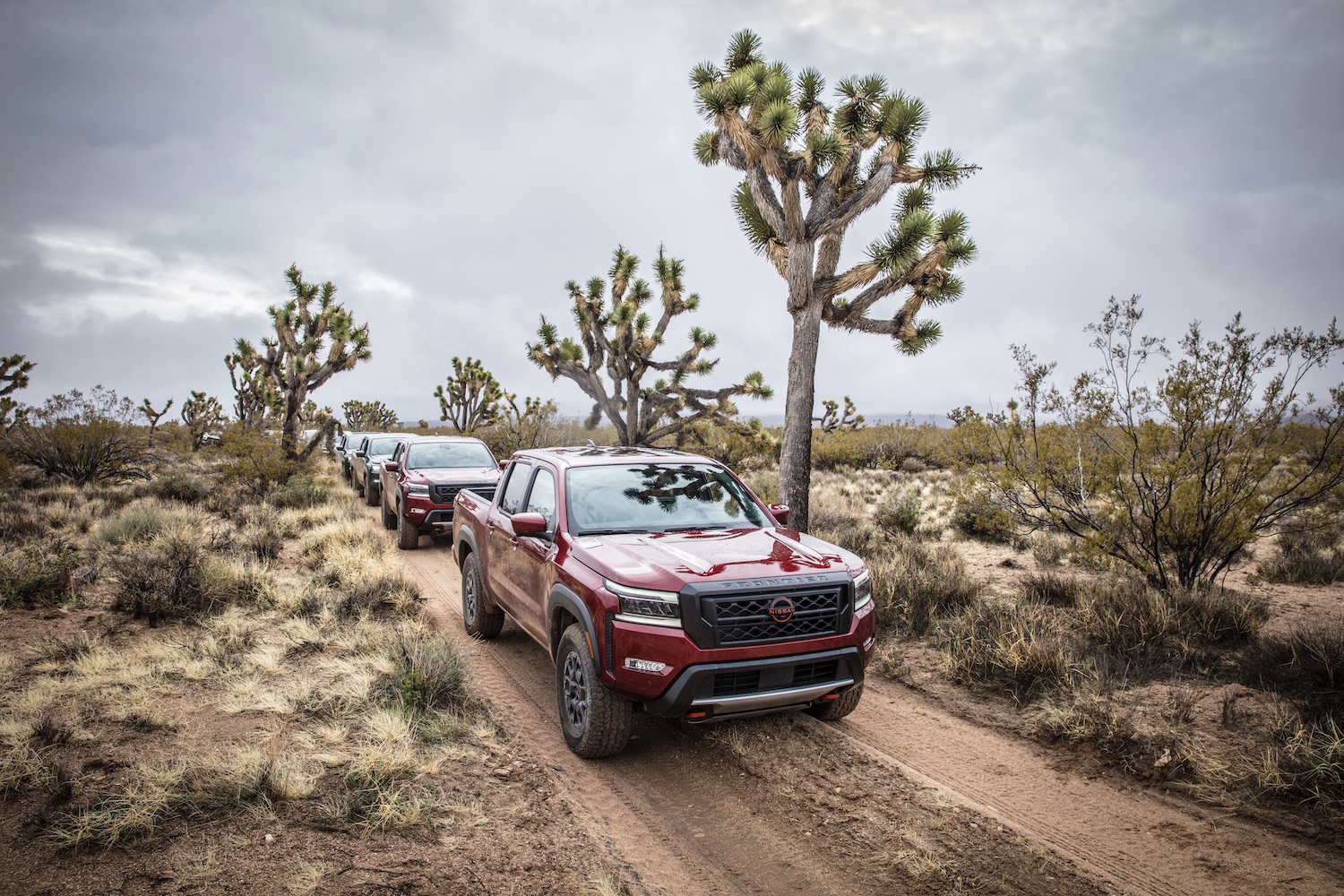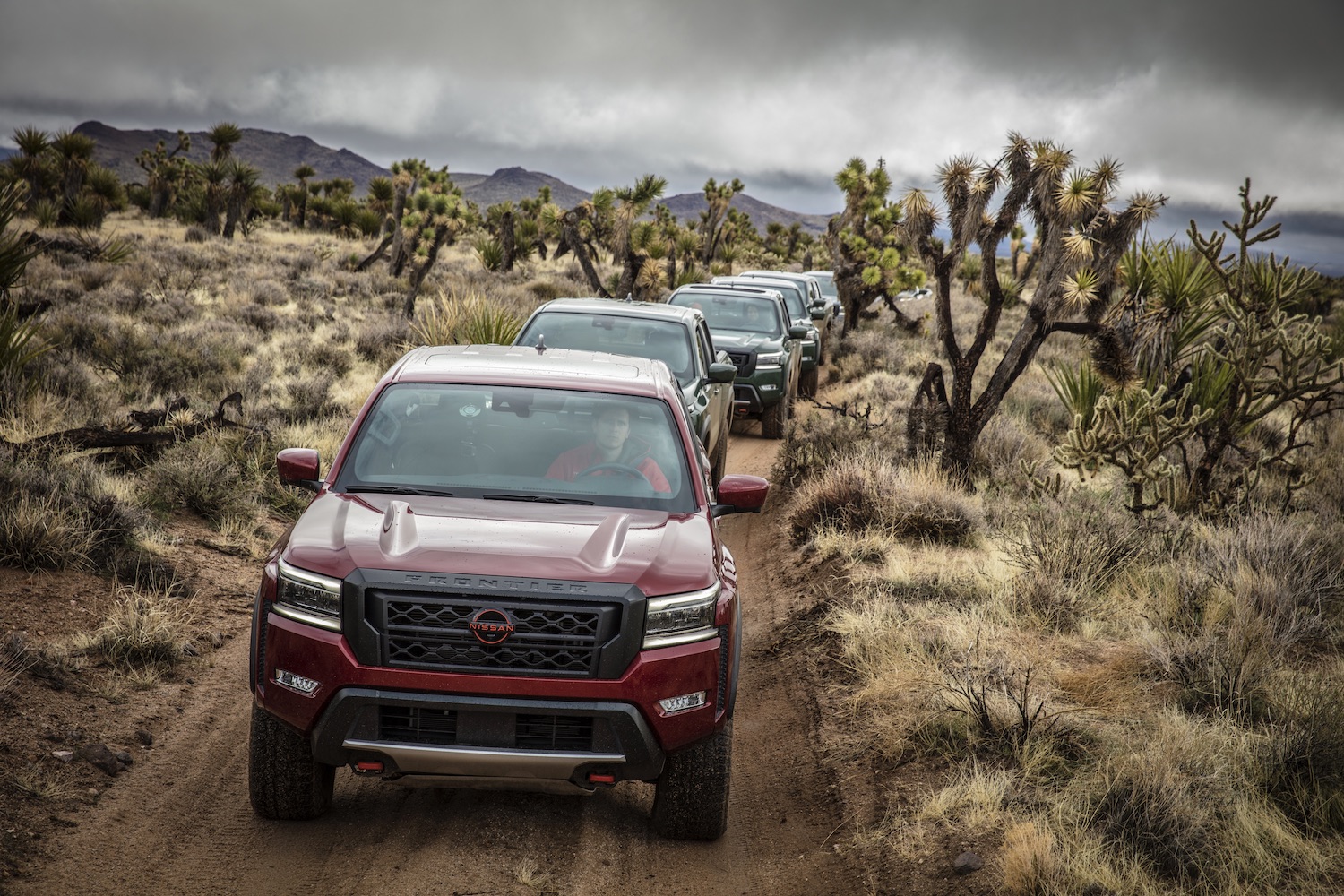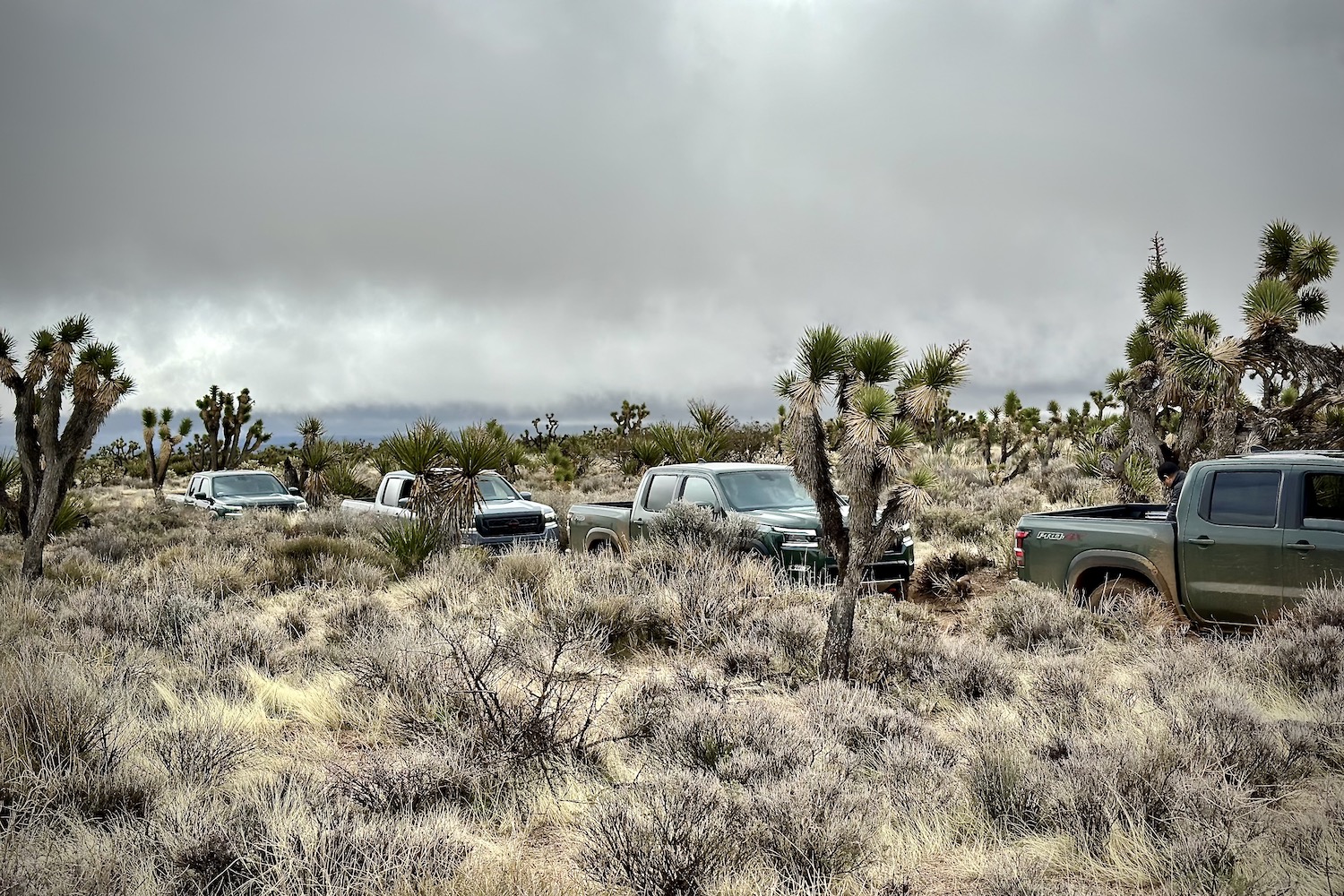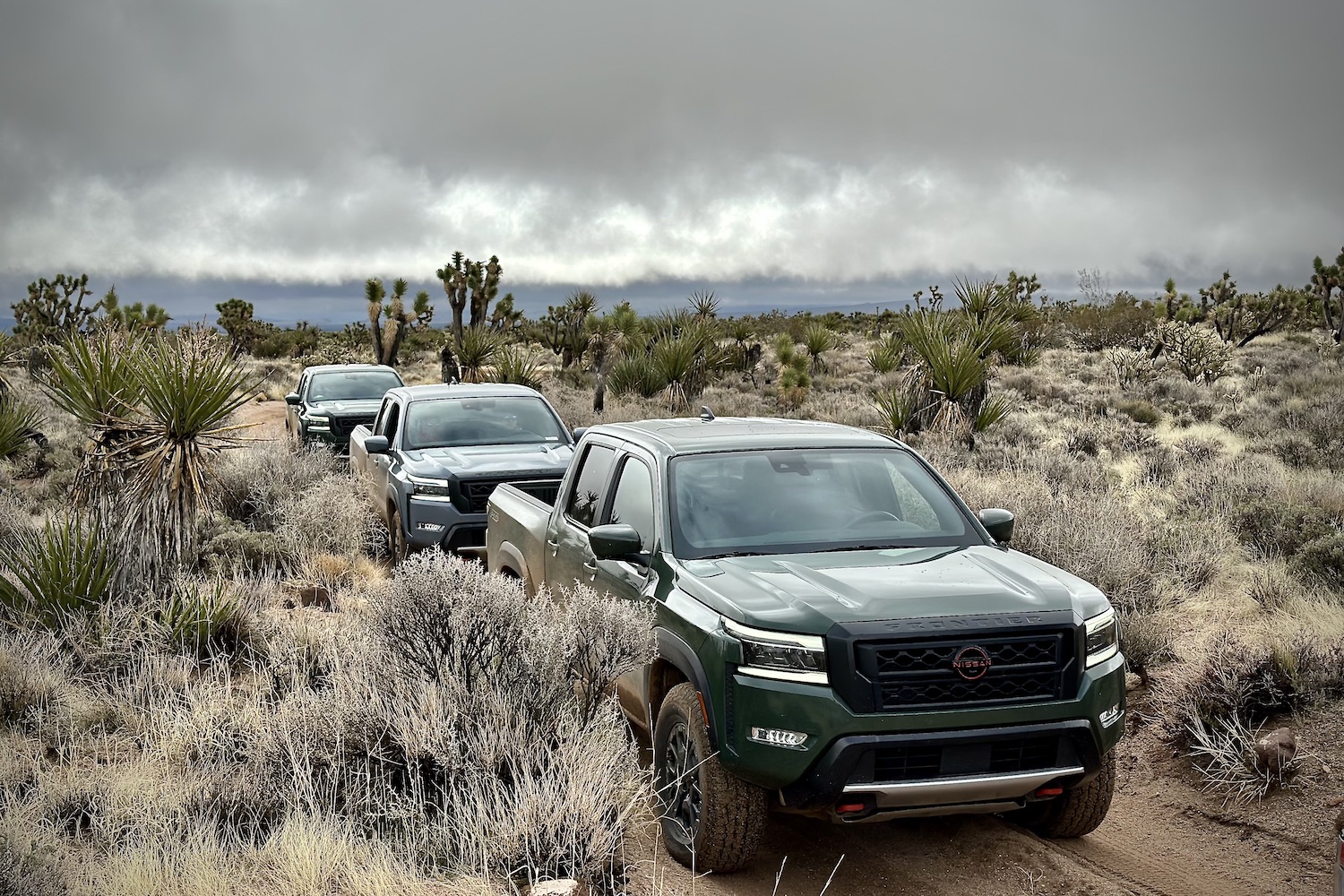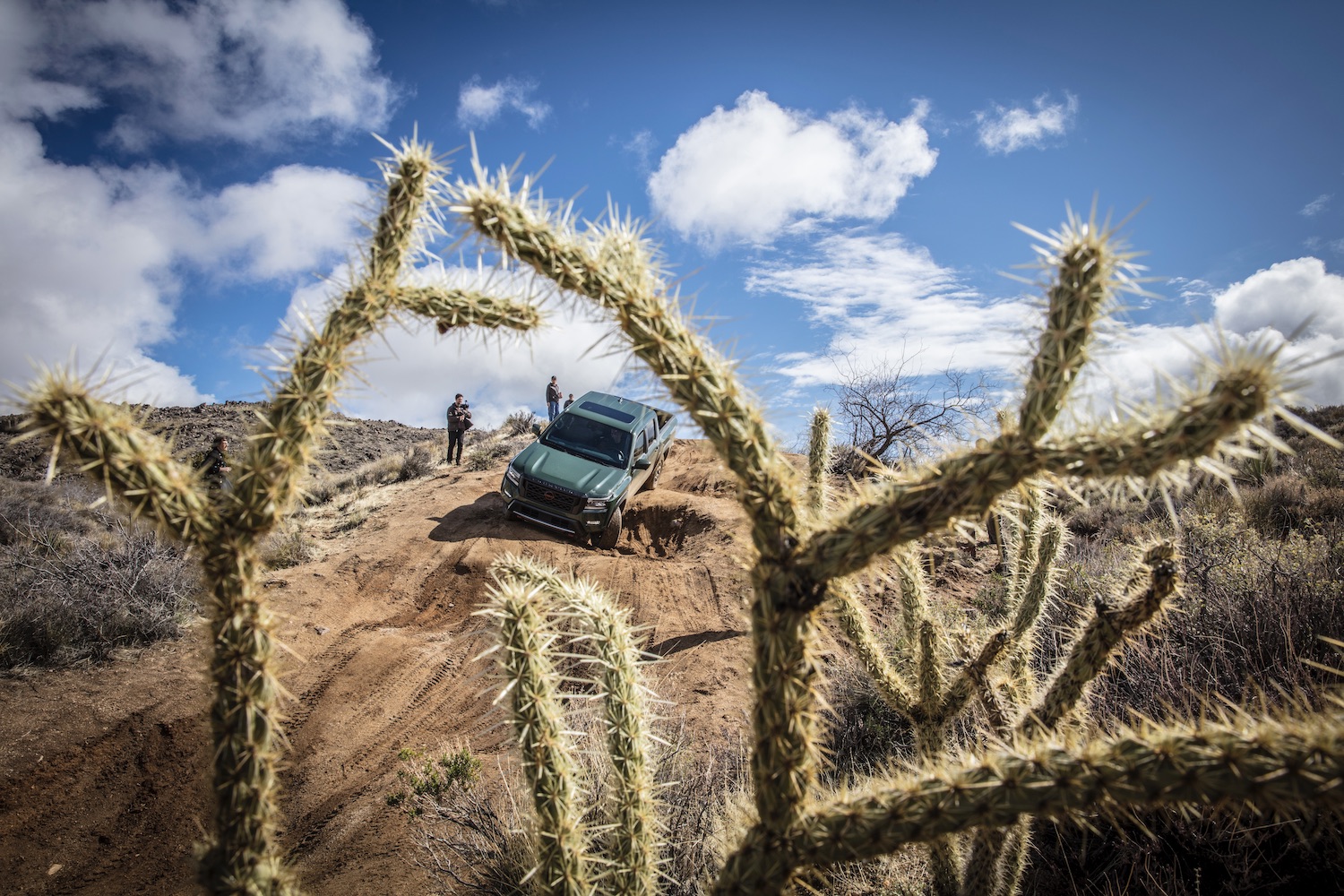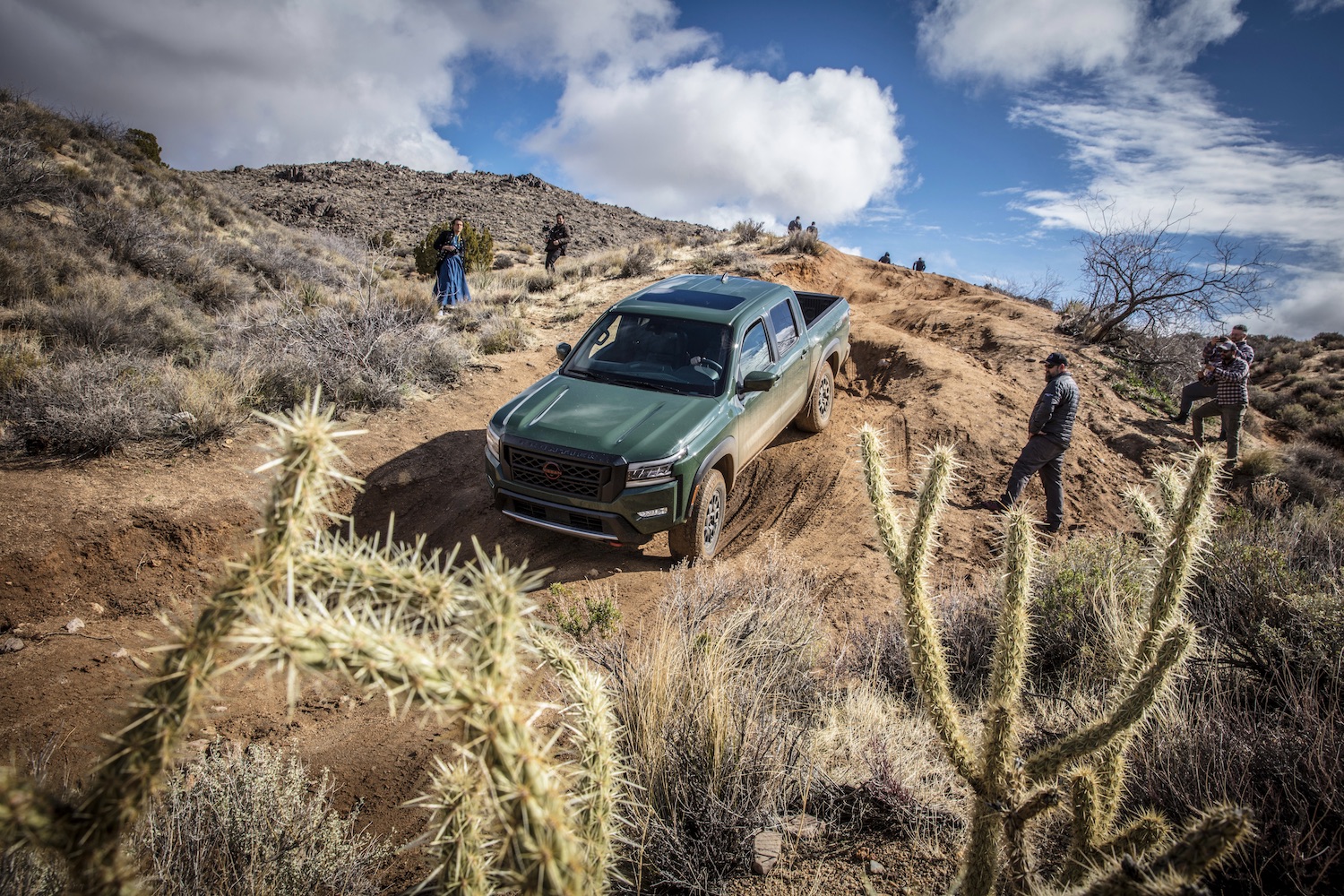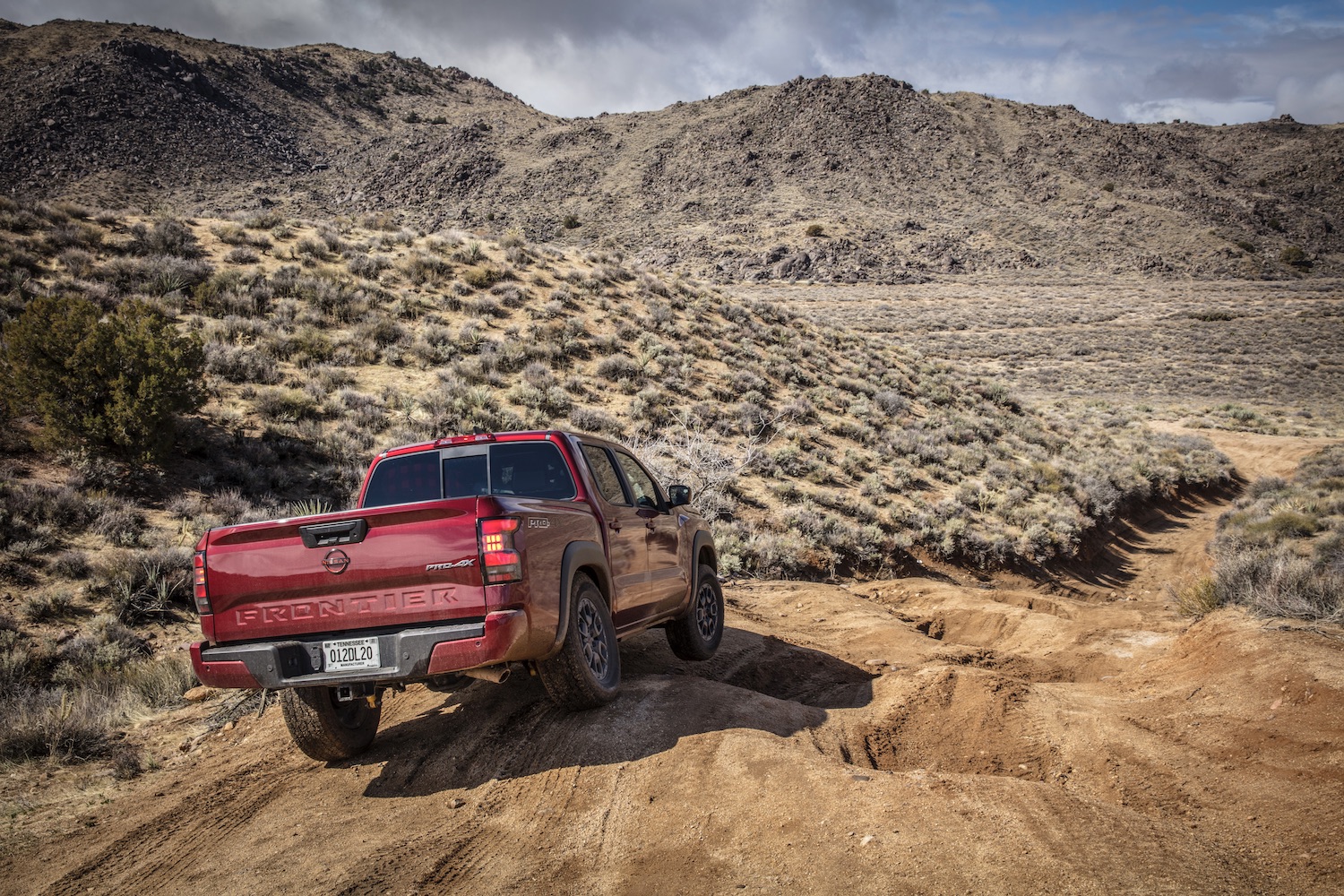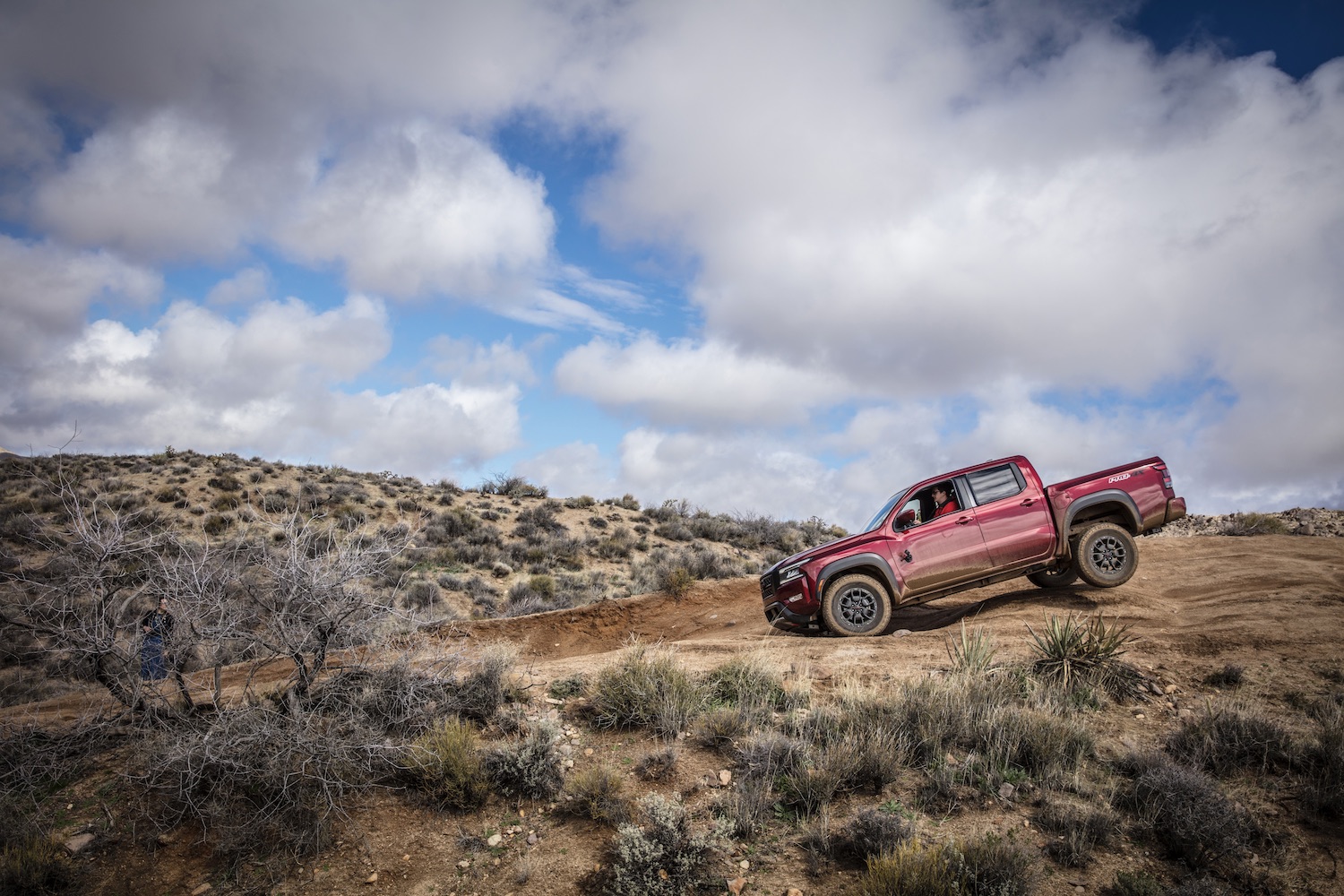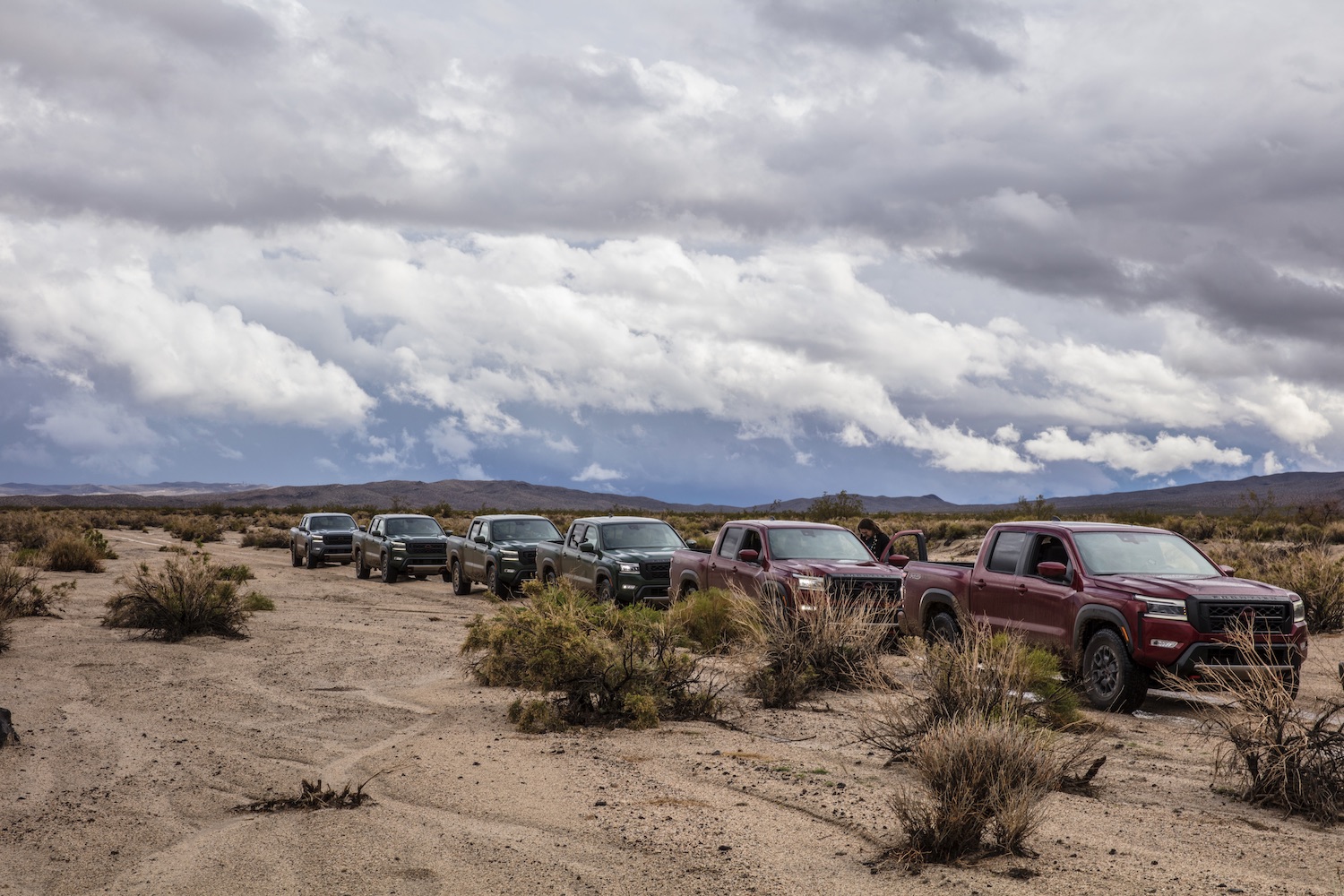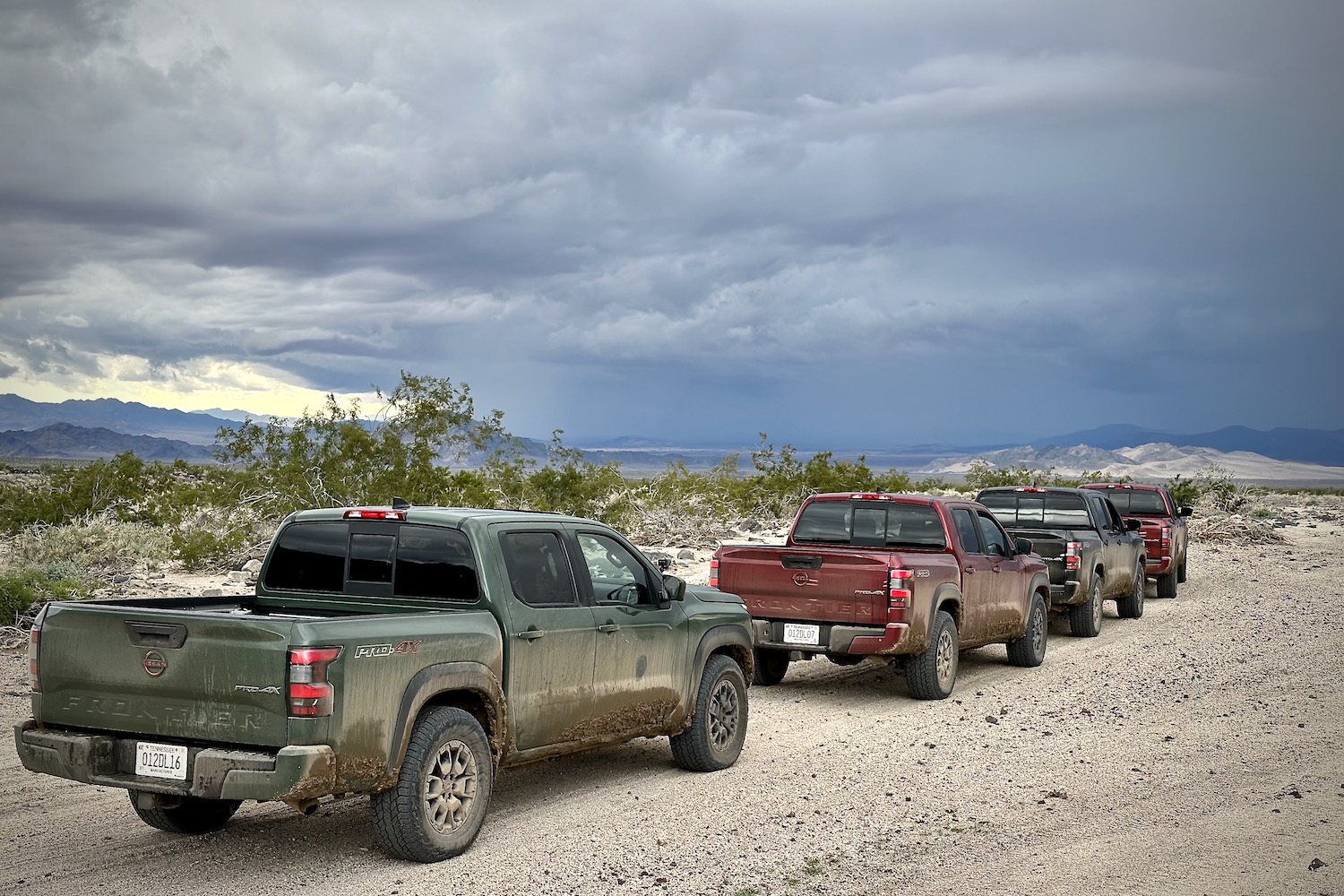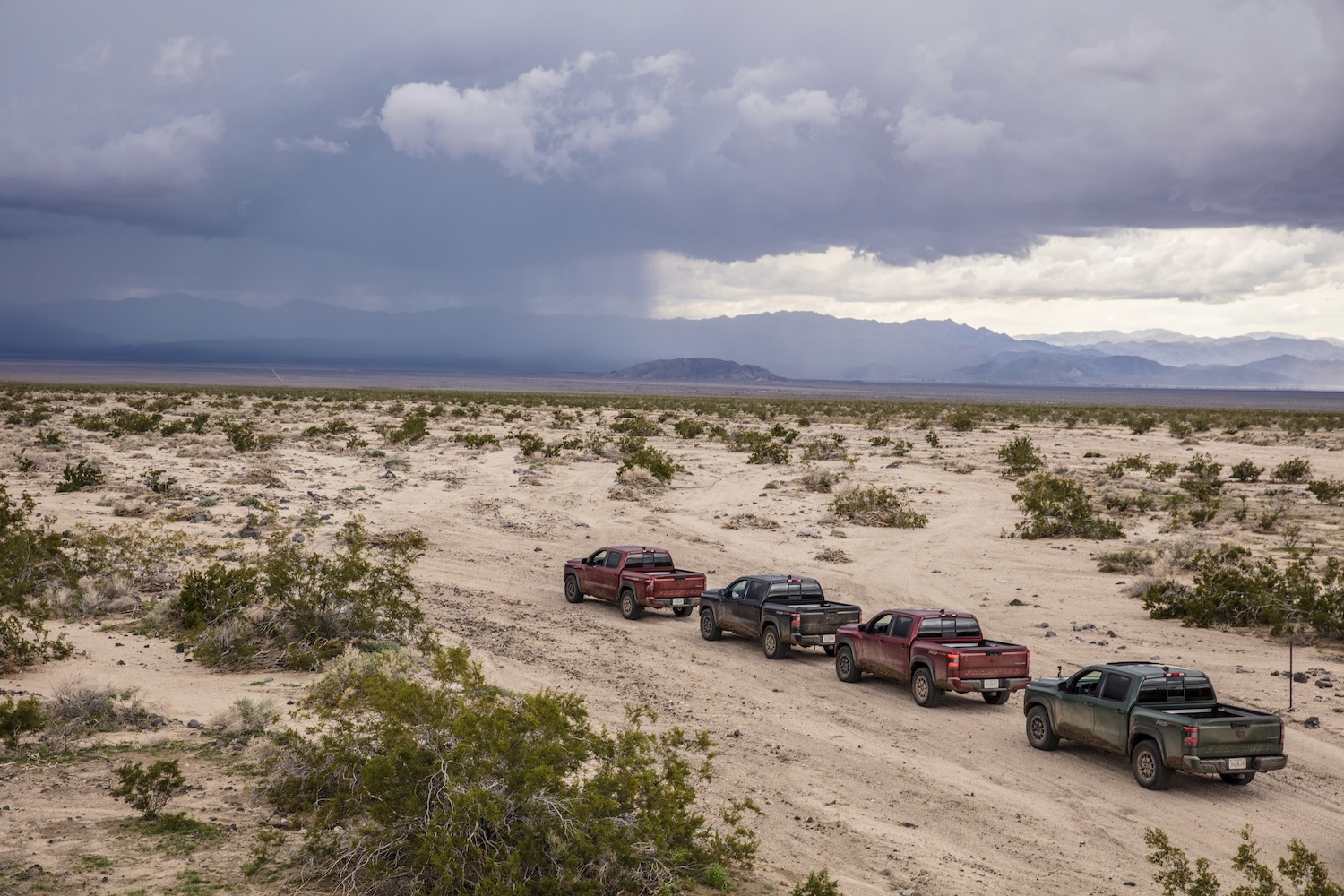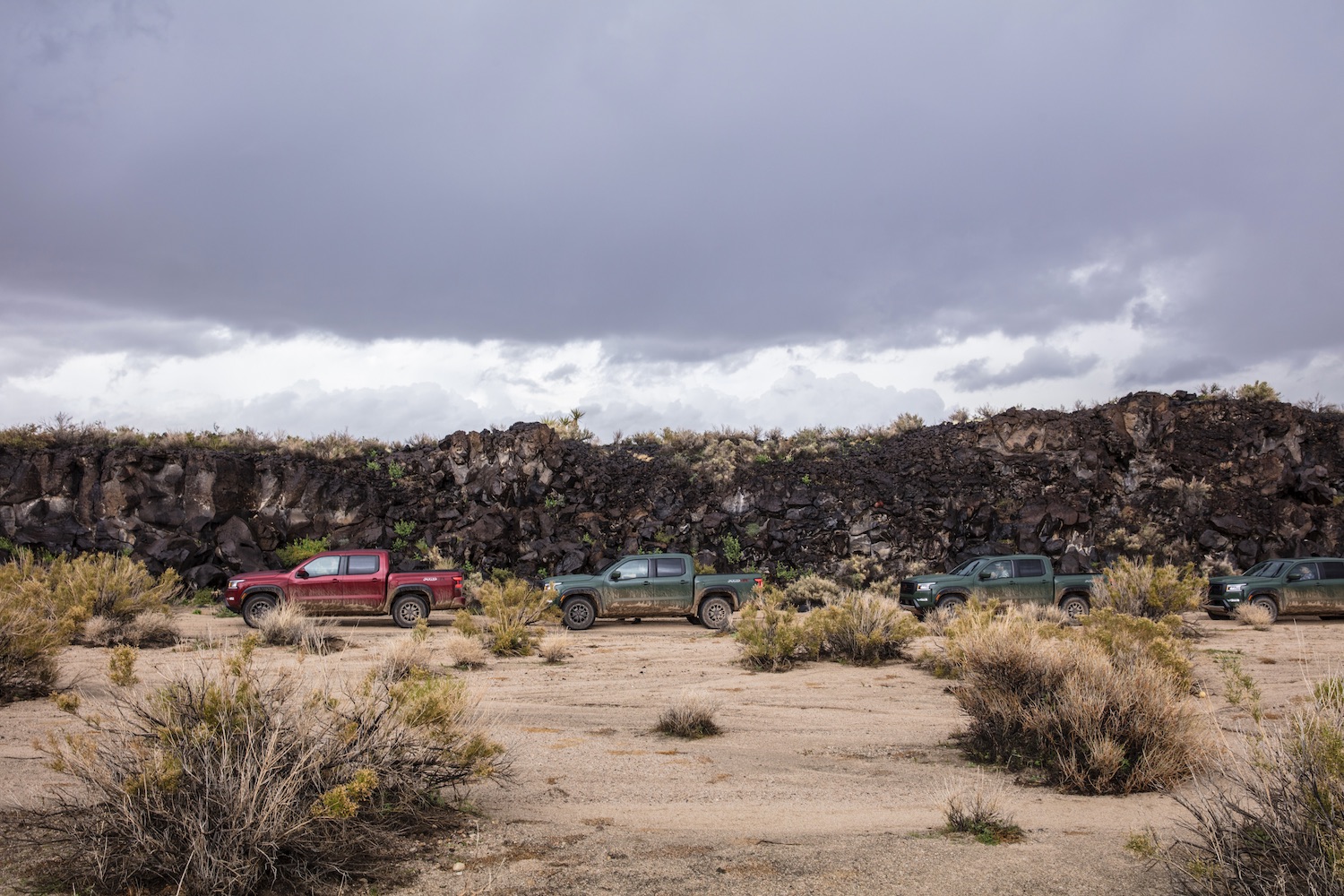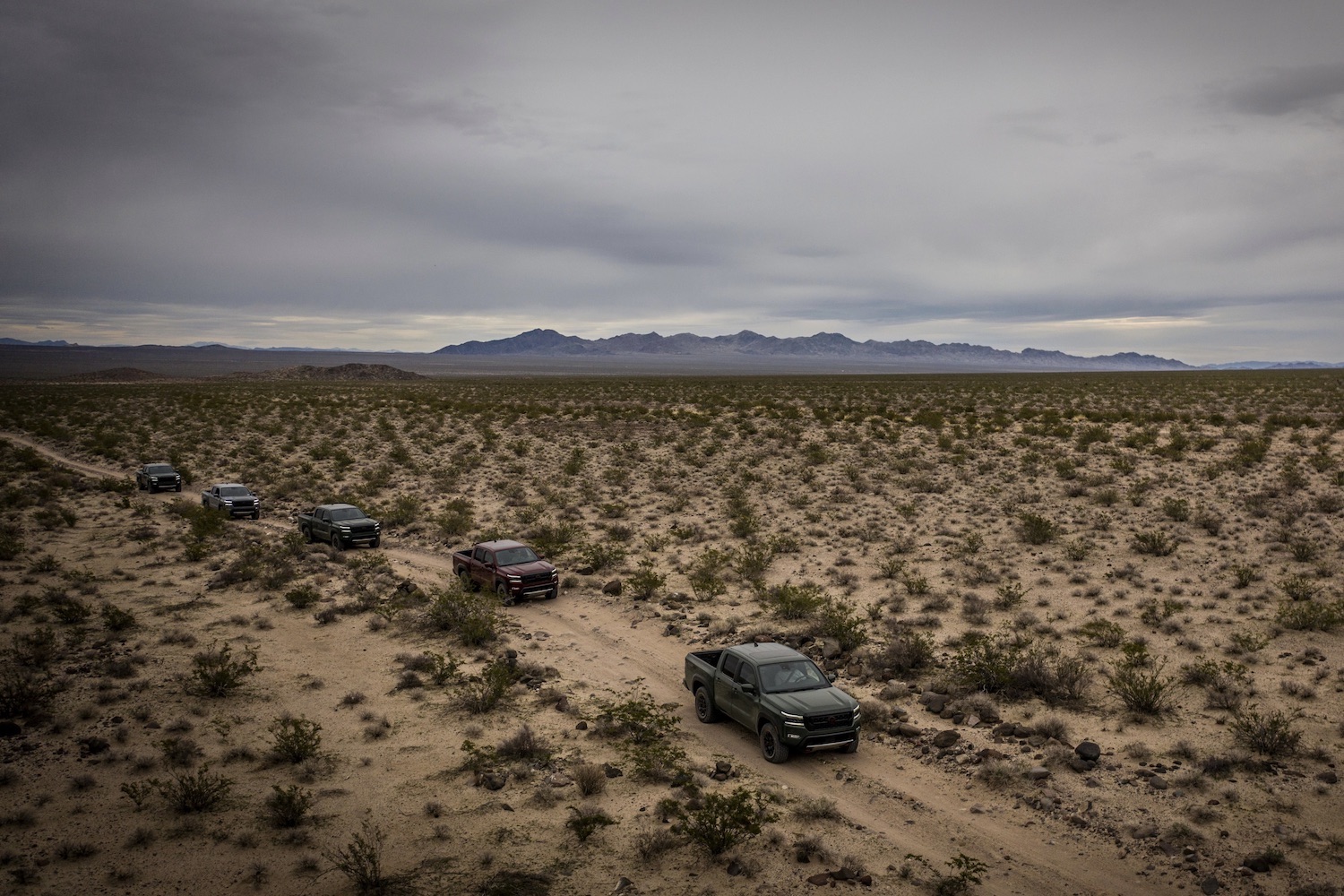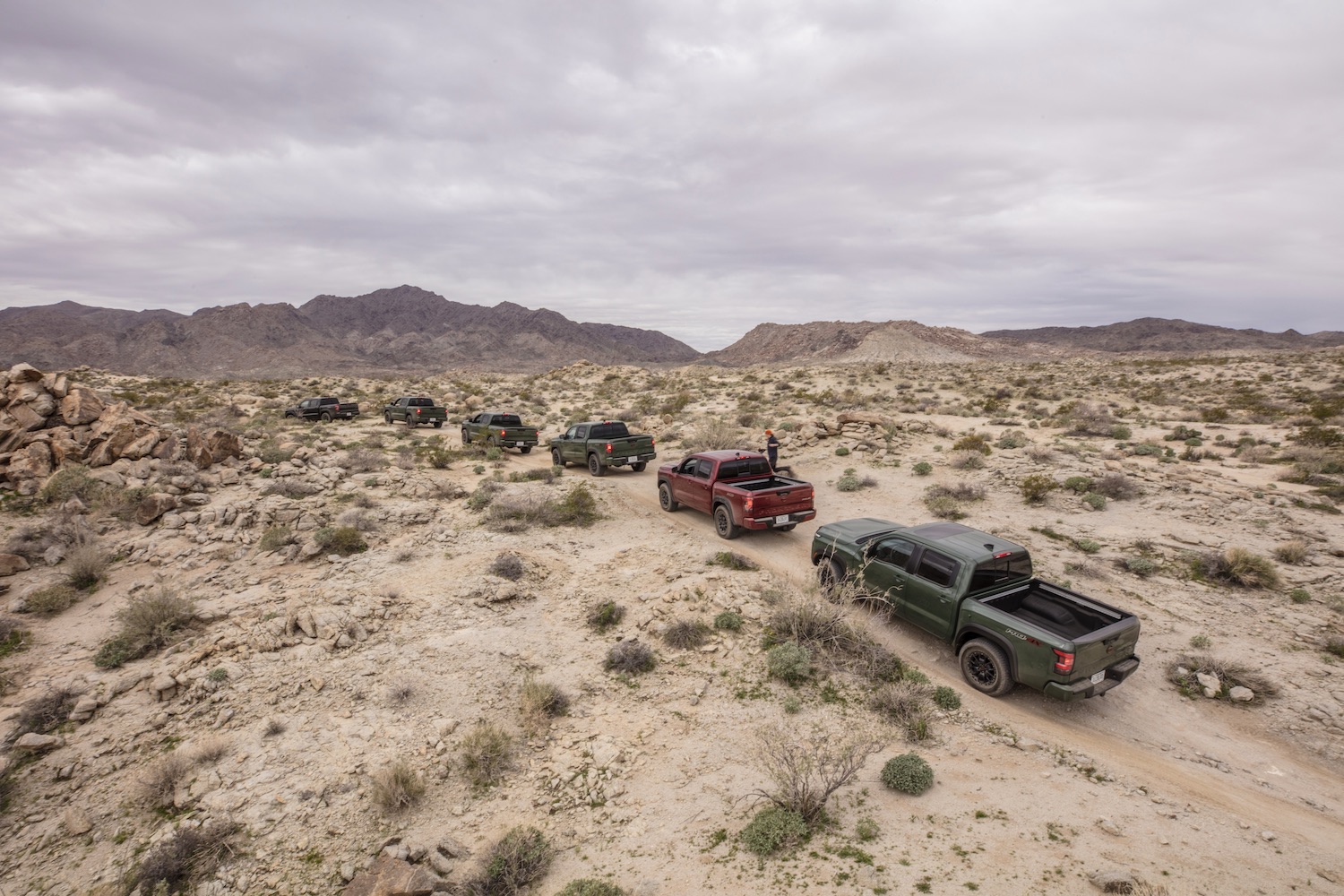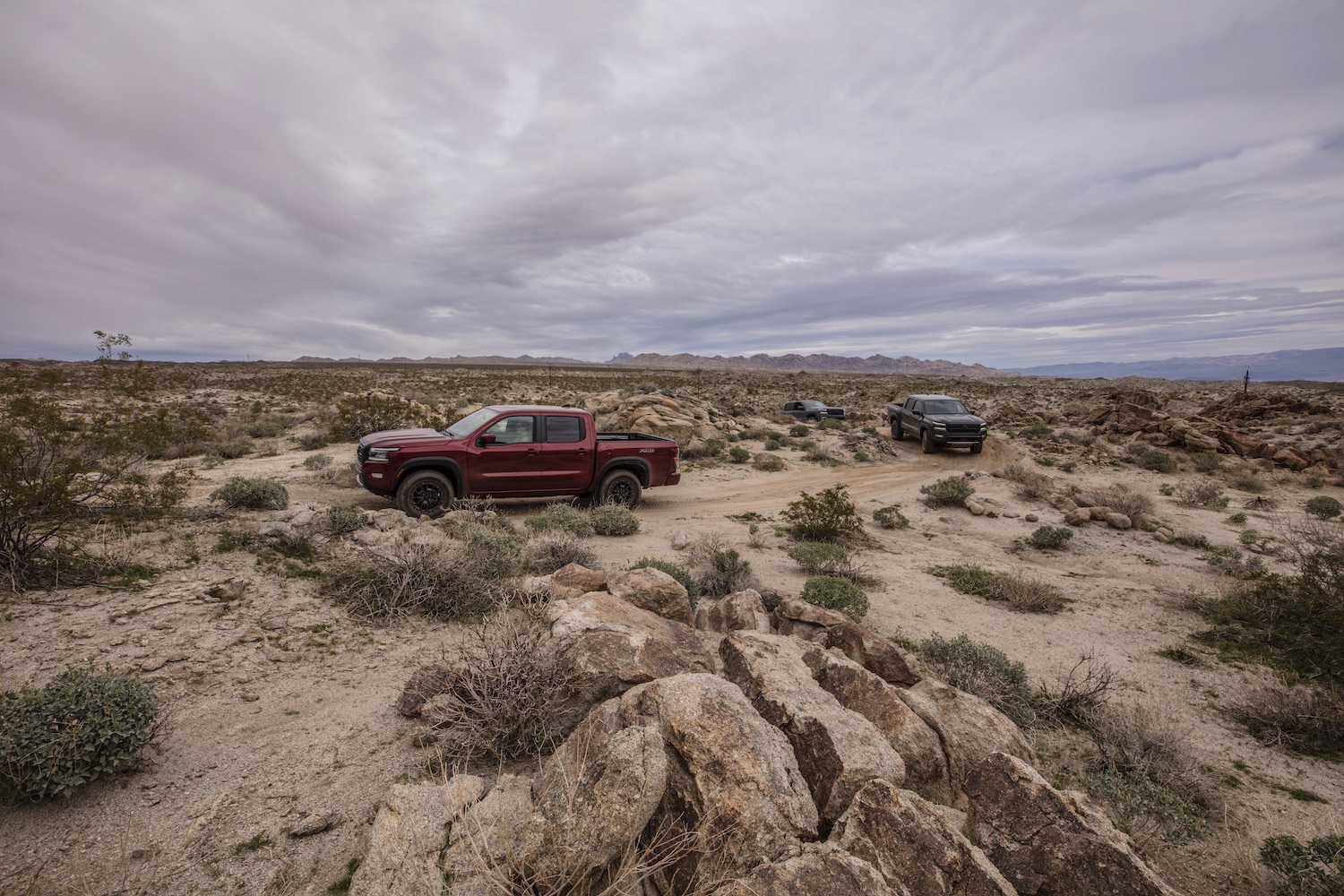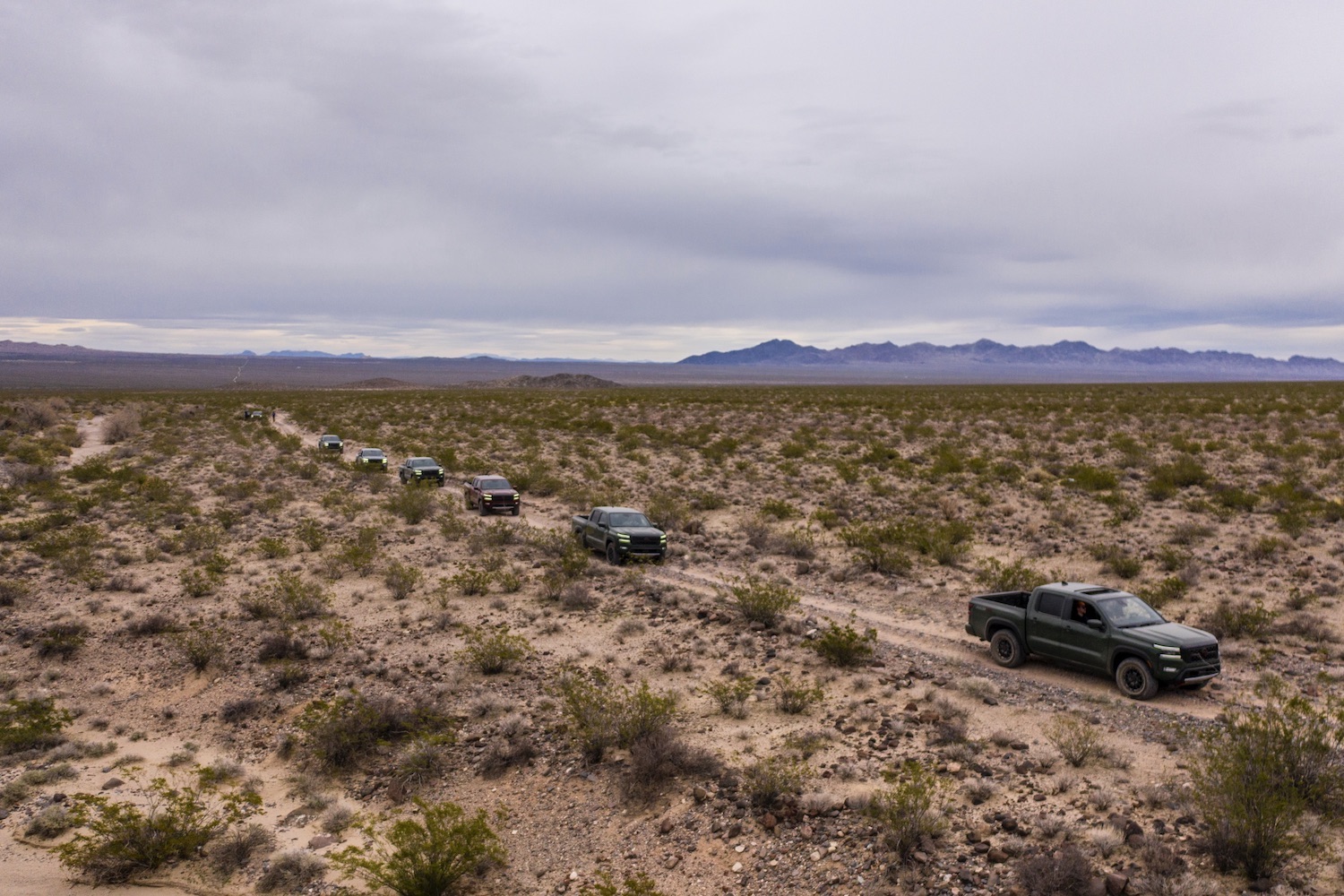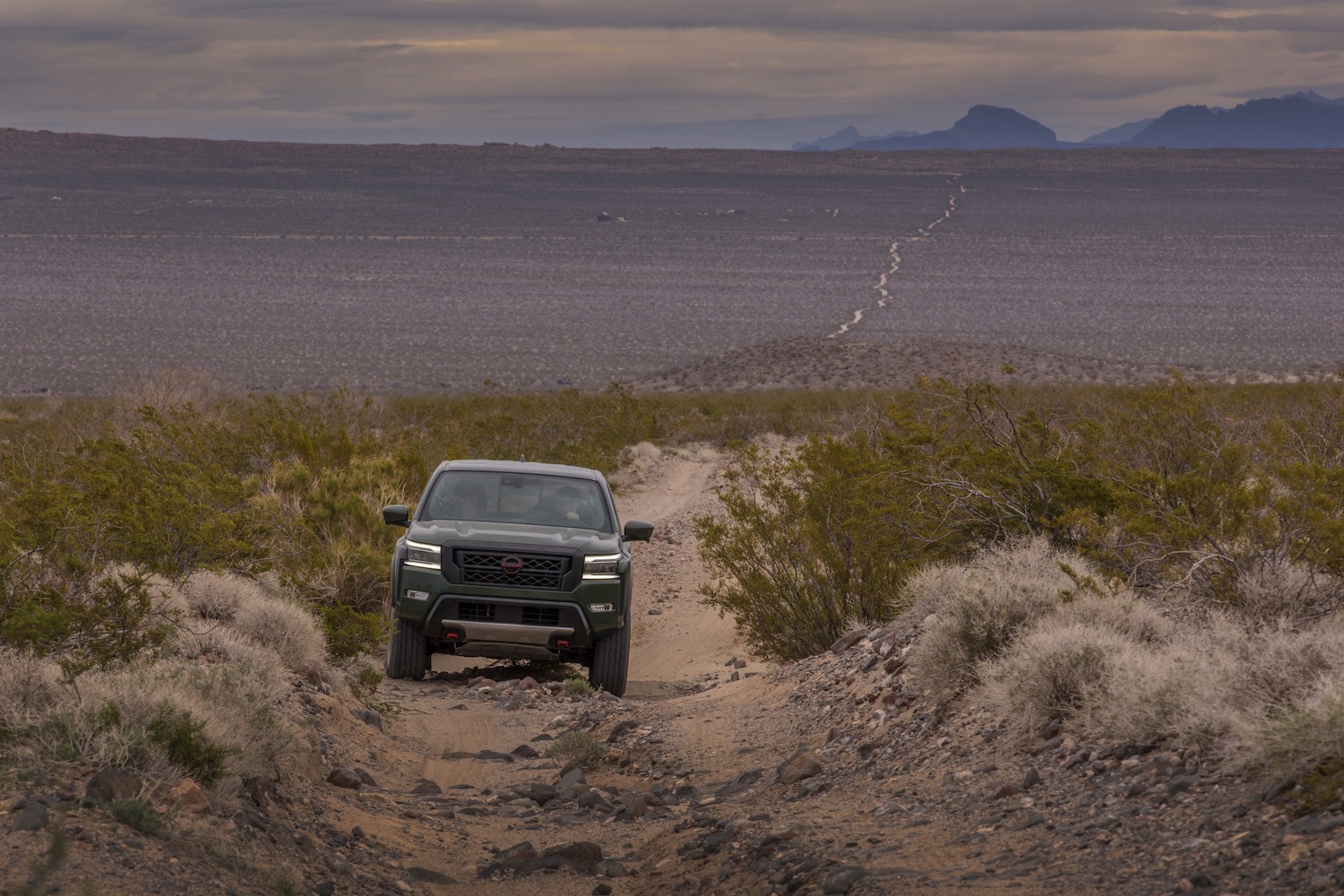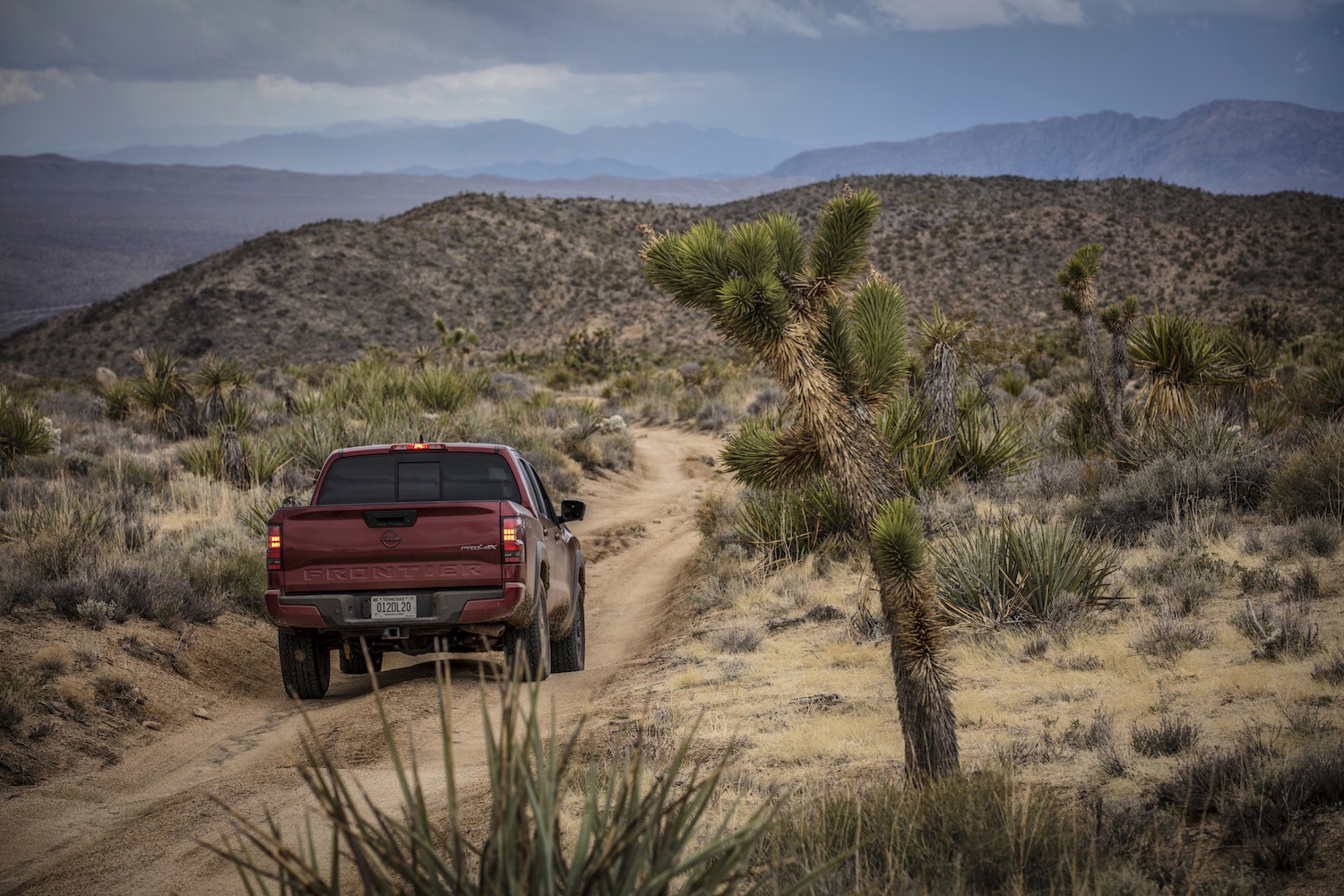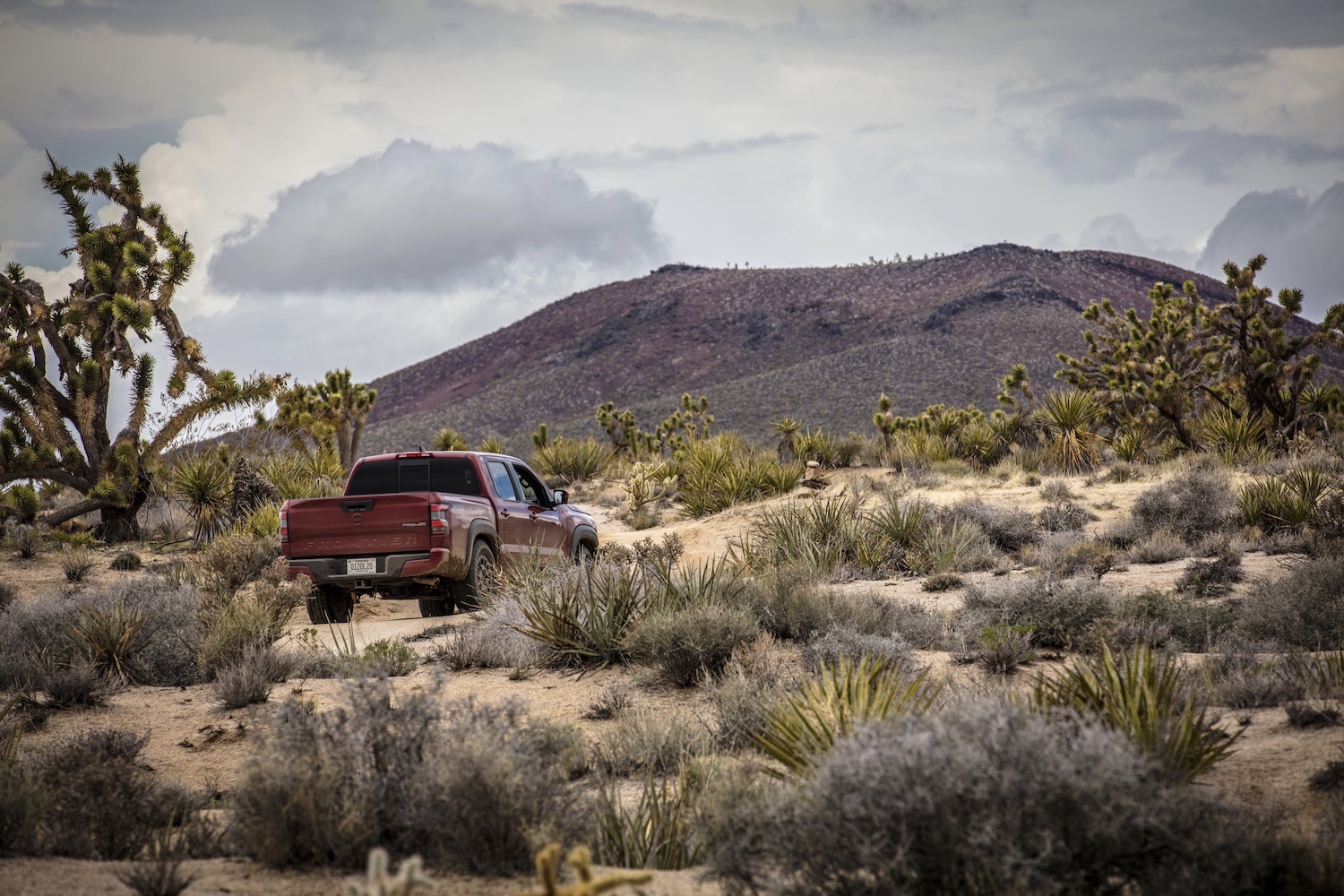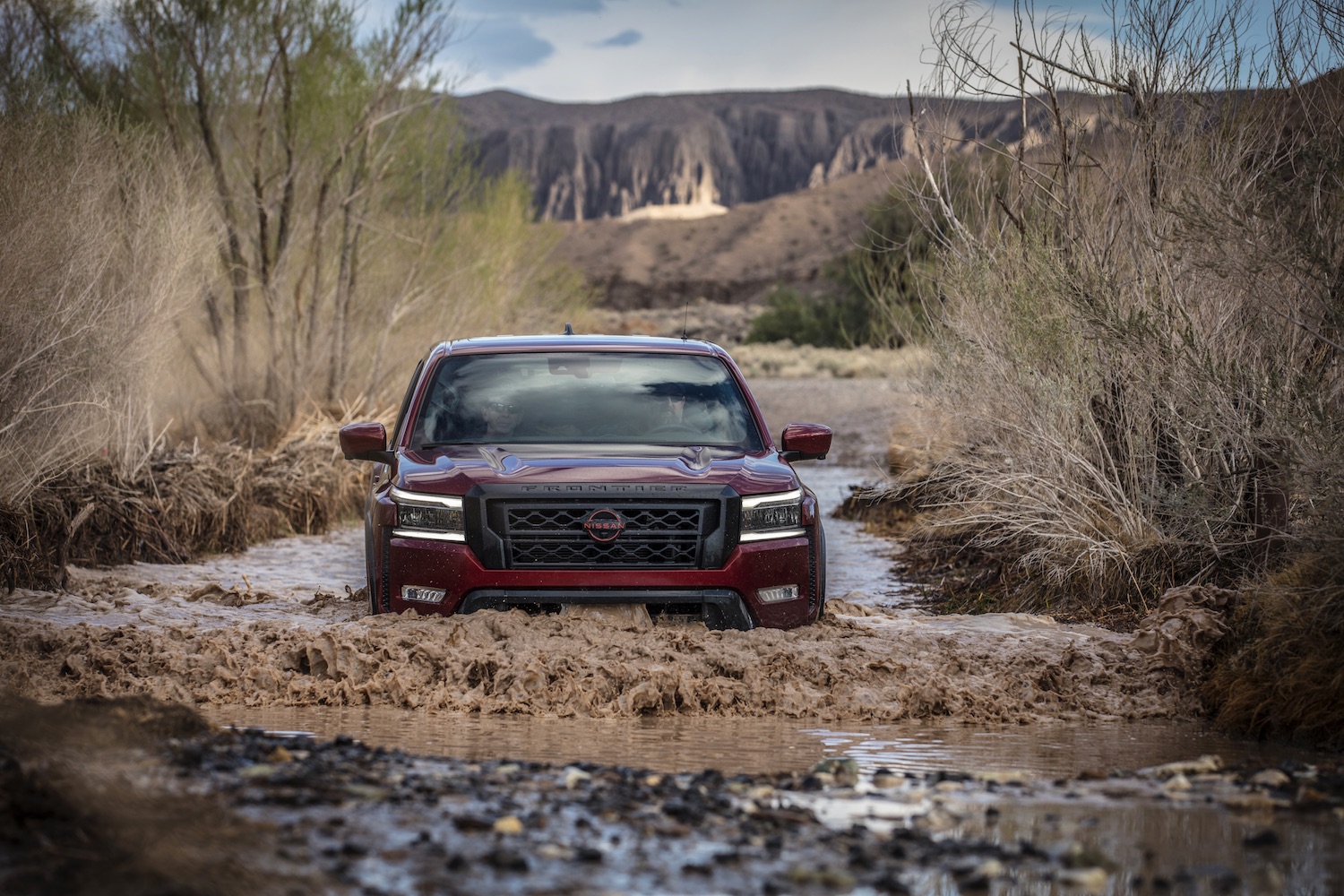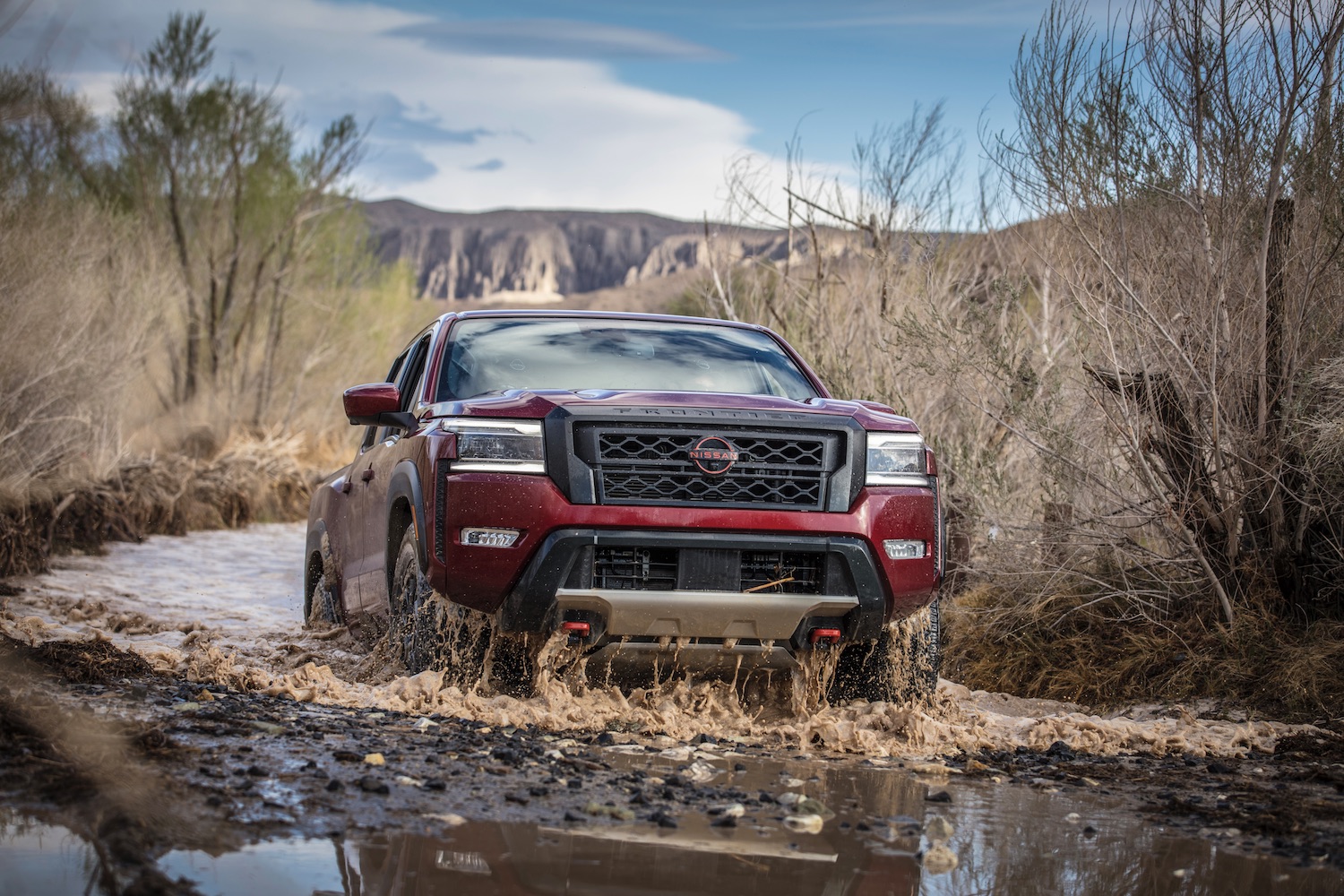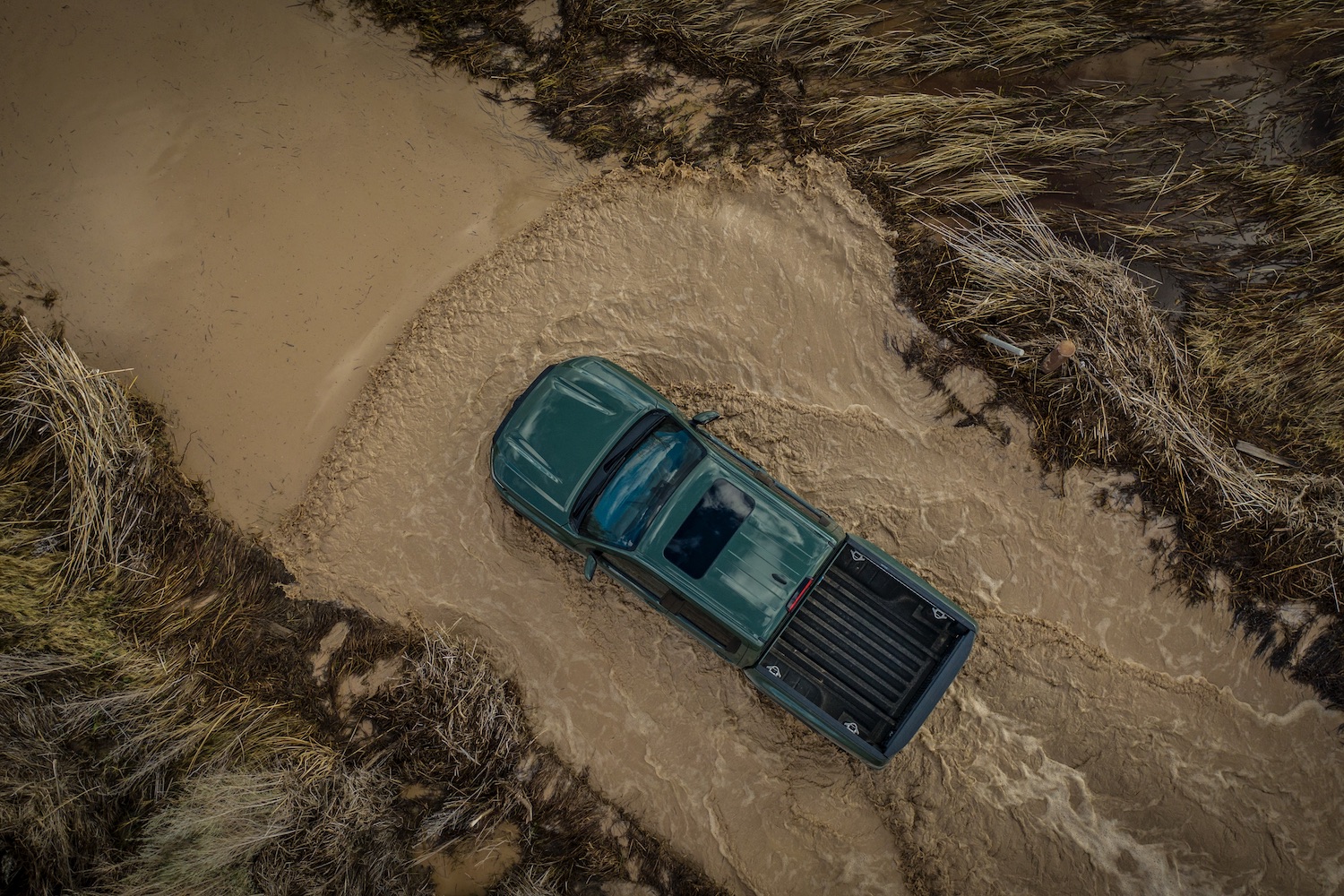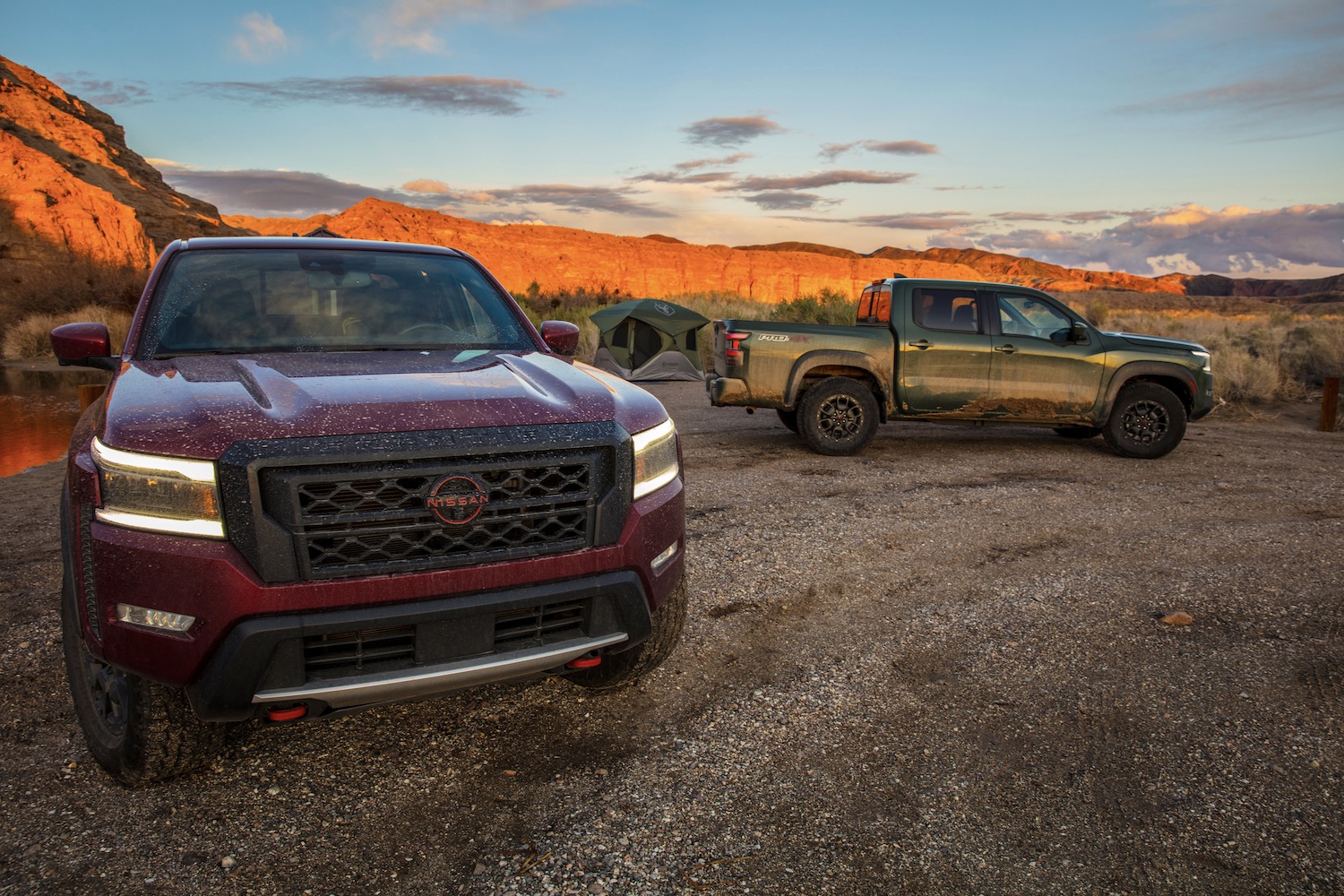There’s something that clicks in your head when you’re staring out the windshield of a vehicle in an area where you know if something goes wrong, there’s really no way to get help. It’s an uneasiness. A voice from your stomach telling you that this is a dumb idea. The Mojave is an expansive, desolate place. Road signs don’t exist, cellphone coverage is spotty at best, and storms rage here. It’s not an easy place to traverse with modern machinery. But early settlers got through with antiquated equipment and all of their belongings. They brought their wagons from the South and the East, using the trail to get to California for a better life. Having done what they did with a modern truck, I have to say that people were built differently back then.
On March 4, 1983, Nissan took 10 1983.5 and 2 1982 Nissan-Datsun 720 King Cab pickup trucks over the Mojave Road as a way to showcase the capability of its new trucks and to help historian Dennis Casebier in his quest to turn the Mojave Road into a recreational trail. The trip turned into a book called Nissan On The Mojave Road, which read like a once-in-a-lifetime expedition.
With Nissan introducing a fully redesigned Frontier after 15 long years for the 2022 model year and the stars aligning with timing, the Japanese automaker decided it wanted to recreate the trip from 40 years ago and invited us along.

Nissan’s lineup has changed quite a bit since the ’80s with its most capable off-roader being the Nissan Frontier Pro-4X. Having driven the Pro-4X truck before and having gone off-roading through the Mojave Desert a few times, I wasn’t quite sure what to expect from Nissan’s regimented adventure. Two full days of driving through desolate terrain in stock trucks sounded daunting, especially for this city boy.
The Nissan Frontier Pro-4X trucks
Let’s talk about the trucks. The Frontier is a classic truck recipe like your grandma’s pancakes. It’s a body-on-frame truck with a 310-horsepower 3.8-liter V6 engine. It’s not the best truck in the class by a mile — that award might go to the new Chevrolet Colorado — but it delivers that durable, last-forever feel that Japanese trucks are coveted for. Beyond being Pro-4X models, which are the most capable in the Frontier lineup, the trucks that Nissan brought were special because they were pre-production models.
Pre-production vehicles represent the messy side of an automaker. They don’t have VINs and are fitted with parts that the government hasn’t tested. This, unfortunately, means that most pre-production vehicles meet their demise at a crusher. With the fate of these Pro-4X trucks cemented in stone, Nissan felt a trip through the desert was a fitting journey before the crusher.
Nissan couldn’t have picked a better truck for the trip. Ford F-150 Raptors and Ram 1500 TRXs might be the Instagrammer’s choice to get clicks, but in the real world where trails are small, fuel economy matters, and triple-digit speeds aren’t realistic, a midsize truck like the Frontier Pro-4X is really what you want. With Bilstein shock absorbers, heavy-duty skid plates, a locking rear differential, tow hooks, 17-inch beadlock-capable wheels (these are an option that are available through a package that were fitted to the truck), and Hankook Dynapro AT2 tires, the Pro-4X comes with necessities and none of the unnecessary fluff.
These Pro-4X trucks handled the terrain incredibly well, especially considering that Hankook tires aren’t really meant for harsh terrain. Truthfully, what the trucks did was highly impressive. Completing long highway jaunts and then entire days of off-roading isn’t an easy task. For off-roading regulars, you’ll want to stick on some knobbier tires and maybe a slight lift, but as a whole, the Pro-4X is a skilled truck from the factory.
From the Vegas Strip to Fort Piute
The first day was more about understanding the extent of the journey and getting into the wilderness than anything else. We departed the Aria hotel in Las Vegas in the morning before pulling into a gas station in Laughlin to fuel up and tire down. After that, it was a short jaunt to the starting point on the banks of the Colorado River that flows through parts of Nevada, California, and Arizona. Once a river that spanned a mile wide, the Colorado River now spans roughly 50 feet in width. It may not be as majestic as it once was, but it’s as good a backdrop as any to start the trek through the desert.
It’s easy going through the first part of the Mojave Road. It’s mostly sand and dirt with few obstacles. The terrain is what you’d expect from a desert — relatively flat with mountains that look like dirt mounds in the distance, growing rapidly before your eyes like the immovable objects they are. We point the truck’s noises toward Fort Piute, being guided mostly by keeping the rock cairns to our right. It’s slow going and the clear view ahead reveals a long, winding trail that cuts directly through mountains that appear hundreds of miles away.
As we approach Fort Piute, the terrain suddenly changes as if someone flipped a switch. The easygoing mixture of sand and dirt is replaced with small, jagged rocks. At this point, we’re thankful for the Frontier Pro-4X’s skid plates and the deflated tires that are hovering around 18 psi. Fort Piute was established in 1859 as a site to make a stand against hostile Indians. More recently, it was used by George and Virginia Irwin who used the location as a ranch in the ’40s and ’50s. It’s bewildering. Why the Irwins looked at the unwelcoming terrain and believed it would be a good location for a ranch is baffling. Eerily, some foundations of the Irwin ranch are still standing, resembling a scene from The Hills Have Eyes.
Our hike around Fort Piute is brought short by storm clouds that are quickly moving in. We choose to take a shortcut to Goff, our basecamp for the night. Our guide points the caravan of Frontier Pro-4X’s nose down a service road and we hammer down, hitting speeds of up to 40 mph on the dirt path.
There’s a lot of time to reflect on the easier, man-made trail. Early settlers must have had a hellish time traversing this terrain in their wagons. Like a nightmarish version of The Oregon Trail, the drive for a better life or the chance of striking gold must have far outweighed the idea of a horrific death. There’s no water, few food sources, and horrendous weather. The idea of undertaking the path today as enjoyment diverges sharply to those who traversed it for survival in the past. Let me say, you couldn’t give me enough money to make me complete the Mojave Trail in the back of a wagon today.
The climb, the descent, and the storms
We were up early the next day. The desert was just as gorgeous as ever, but the dark clouds and drizzle from the day before remained. Still, we headed out on the trail and began to climb. Mountains hidden behind clouds passed by, and the occasional Joshua tree appeared sporadically. Last night’s rain and the drizzle in the morning created a muddier trail than the previous day. It clings to the trucks and coats them in an honest day’s work shade of reddish brown.
The Joshua trees become denser and more prevalent as we continue to rise, and so does the foliage. The wide dirt path that we we’re traveling on narrows to barely being wide enough to accommodate the Frontier. Anything that goes up has to come down.
The problem with traveling through mountains is that you eventually run into one that you can’t go around. We line the trucks up before a serious descent. One that really pushes the Frontier Pro-4Xs to the limit. Our guide acts as a spotter for the caravan, giving each driver instructions on the best way to get down the steep section. Some trucks lift their front wheels, others lift their rear wheels, and most scrape their front skid plates. But they all make it down.
It’s a true testament to a proper four-wheel-drive system with low-range gearing. The night and morning rain created a dicey situation where too much reliance on the brakes would see the truck careen uncontrollably down the drop, while not enough would result in the trunk getting stuck in an odd position. The obstacle isn’t the most technical off-road thing I’ve had to get through, but it is the most technical one I’ve tackled in a stock vehicle.
The next landscape to conquer is a lava field with a volcano that was only classified as being dormant 1,000 years ago, which apparently isn’t that long ago in the world of volcanoes. Speak about otherworldly. This landscape truly looks extraterrestrial with black rocks the size of cars that have formed a natural wall. As some people jump out of the trucks to grab a shot of the alien terrain, our guide spots a massive thunderstorm approaching our location just outside of Baker, California. Storms in the desert are serious. Deadly serious. Rain comes fast and hard and the ground floods easily. With the caravan traveling through a known flood zone, our guide sends a command on the radio to not stop for photos and to hammer down.
The terrain just outside of Soda Lake resembles the bottom of a lake bed. It makes for easy terrain for the Frontier Pro-4X to hit 50 mph on. Forget about bushes scratching the paint, the skid plate getting bashed, or the epic landscape that resembles a movie. The convoy sticks close to one another, which is a blessing as the lead truck’s taillights are the only visible thing in the midst of the torrential downpour. Frightening, epic, and surreal all balled into one experience. We entered Baker feeling like we had outrun death itself as rivers begin to form on the roads.
The desert leaves its mark
We covered roughly 130 miles on the Mojave Trail over two long days. Despite traveling through grueling terrain that went from a dirt path, continuous whoops that made you nauseous, jagged rocks, the bottom of a lake bed, to a seriously bad drop, the 2022 Nissan Frontier Pro-4X made it without any issues. And it’s not like one truck made it. No, the entire caravan made it without a single issue. Admiration for the Frontier was shared by everyone at that night’s dinner.
For all of its flaws, the Frontier Pro-4X felt like it was built for this trip. The rugged truck offered the right mixture of simplicity to be an uncomplicated truck to get through the slog, while not being a dog on the lengthy highway jaunts from and to Vegas. It did everything all of us asked it to do, while holding all of our gear. And the fact that the trucks were bone stock is even nobler.
It’s sad to think that the very trucks we drove were scheduled to get crushed immediately after the trip. These trucks deserve more. At least one of them deserved to be saved, coveted, and awarded. Nissan should stuff one away in its vault for a rainy day. Just to look at, mud and all, as proof of just how capable modern trucks are. And also, of how dramatically vehicles have evolved over the years.
Few press trips leave a mark on you. It’s part of the job. You spend 12 hours traveling one way just to spend all day traveling, but this time in a car. Rinse and repeat. Very rarely do you get to experience a vehicle in its element, especially when the landscape makes you question your existence on a small rock hurling through space like the Mojave Desert does. No, the Nissan Frontier isn’t the best truck on sale. But today’s obsession with buying the best and being the best is overrated. Buy a vehicle that appeals to you and speaks to you. After a trip through the Mojave, it’s obvious that the Frontier spoke to us.
Editors' Recommendations
- From 4×4 Jeeps to exotic sports cars, Turo is where to score your next rental car
- Acura MDX Type S: 4 things we love about it (and 3 things we hate)
